69+ Situational Irony Examples (Definition + List)

Have you ever expected one thing to happen, only for the complete opposite to take place? Maybe you thought it was going to be a sunny day, so you planned a beach trip—only for it to rain cats and dogs.
Or perhaps you've watched a movie where the character thinks they're about to get a wonderful surprise, but it turns out to be anything but. If you've experienced or seen situations like these, then you've encountered what's known as "situational irony."
Situational irony is when the opposite of what you expect to happen occurs, creating a surprising twist. It's like life playing a little joke on us, where our expectations and reality don't match up.
Situational irony is a fascinating twist that life—and art—often throws at us. It makes stories more intriguing, conversations more engaging, and even helps us see the humor in life's little mishaps.
But what exactly is situational irony? Why do we seem to enjoy it so much, and how can you spot it in different parts of your life? In this article, we'll dive deep into the world of situational irony, explore some unforgettable examples, and even look at why our brains are wired to appreciate this curious phenomenon.

What is Irony?
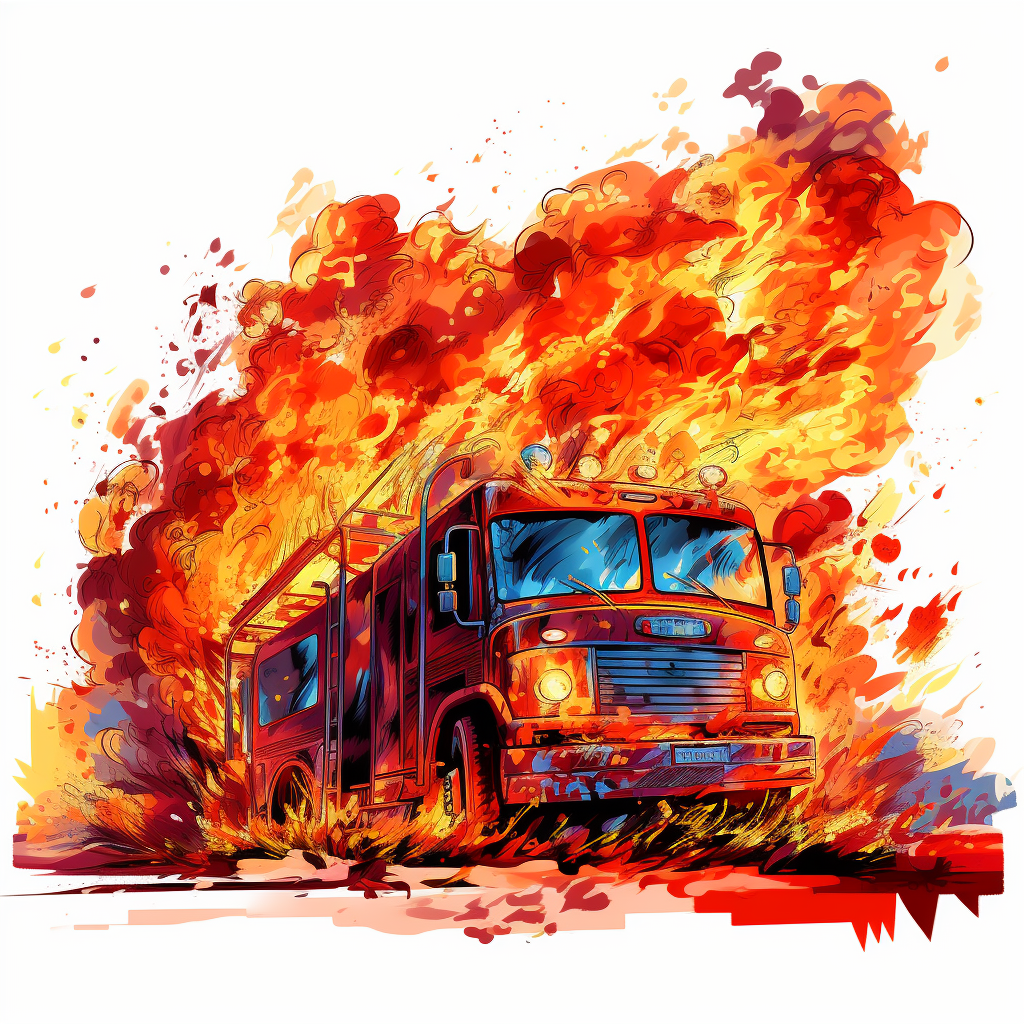
When people think of irony, they often imagine someone saying something but meaning the opposite, like saying "Oh, great!" when something bad happens. But did you know irony comes in different flavors? That's right—irony isn't a one-size-fits-all kind of thing. There are three main types: verbal irony, dramatic irony, and situational irony. Let's break them down.
Verbal Irony
Verbal irony is the kind most people are familiar with. It's when you say something but mean the opposite. For example, if it's pouring rain outside and you say, "What a beautiful day," that's verbal irony. You're using words to express something opposite to their usual meaning, often for emphasis or humor.
Dramatic Irony
Dramatic irony is a bit like being in on a secret that some of the characters in a story don't know. Imagine watching a movie where you know there's a hidden treasure in a room, but the characters are completely unaware.
You might be yelling at the screen, "It's right there! Look behind the painting!" That's dramatic irony—you know something crucial that the characters don't, which makes the situation tense or funny.
Situational Irony
Now, let's get to the star of the show: situational irony. Situational irony happens when the complete opposite of what you expect to happen actually occurs. For example, imagine a fire station burning down. You'd think that of all places, a fire station would be the safest from fire. But life often has other plans, and that's what situational irony is all about.
Situational irony isn't just a literary tool; it pops up in our everyday lives too. It's when you run late for a "Time Management" seminar or when a bird poops on a freshly washed car. It happens when the quiet student in the class turns out to be an amazing public speaker, or when you finally find your lost keys in the last place you'd ever think to look.
In situational irony, there are usually three key elements:
- Expectation: What you think will happen or what usually happens in a similar situation.
- Reality: What actually happens, which is the total opposite of the expectation.
- The "Ah-ha!" Moment: The point where you realize the irony, usually making you chuckle or shake your head in disbelief.
In a nutshell, situational irony is when life doesn't go as planned—in a way that's opposite to what you'd expect, and often in a manner that's amusing or enlightening.
Why Do We Use Irony?
You might be wondering, "Why do we even have irony? What's the point?" Great questions! Irony, including situational irony, isn't just some random thing that happens. It serves several purposes, both in our minds and in society. Let's take a closer look.
Psychological Reasons
- Emotional Distancing or Coping Mechanism: Life is full of surprises, not all of them pleasant. When something opposite to what we expect happens, recognizing the irony can help us cope. It's like saying, "Well, isn't this ironic?" and giving yourself a moment to step back from the situation. This emotional distance can make things easier to handle. It can also be used in a manipulative way , though.
- Making a Point in a Creative or Humorous Way: Irony can be a powerful tool for making your point without being direct. For instance, let's say your friend is always late, and one day they finally arrive on time. You might say, "Wow, look who's on time—a miracle!" The irony helps emphasize your point while also adding humor.
- Encouraging Critical Thinking: Situational irony often makes us stop and think, "Wait a minute, something's not right here." This moment of realization encourages us to think more deeply about situations , challenging our assumptions and expectations.
Social Reasons
- Building Rapport or Showing Cleverness: Irony can be like a secret language or inside joke among friends or people who understand it. Recognizing irony together can build a sense of closeness or rapport. It can also be a way to show off how clever or insightful you are—like saying, "Hey, did you catch that irony?"
- Irony as a Form of Social Commentary: Sometimes irony is used to point out the flaws, absurdities, or contradictions in society. For example, if a sign at a park says "Don't Walk on the Grass" and it's surrounded by a concrete jungle with no greenery, that's ironic. It makes you think about how sometimes rules or systems don't make sense.
- Irony as Comedy: More intentionally, irony can be used as a form of humor. Comedians use it, but so do regular people with their friends, coworkers, or just in general. It's one of many forms of humor .
What About Situational Irony?
Situational irony is especially interesting because it doesn't always need words—it often just happens, in life or in stories. It makes us feel smart when we catch it, and it often brings a smile to our faces or makes us shake our heads in disbelief. In a way, situational irony is like life's way of keeping us on our toes, reminding us that things don't always go as planned, and that's okay.
So, the next time you find yourself in an ironic situation, remember: it's not just a funny coincidence. It's a psychological and social tool that makes life a little more interesting, helps us cope with the unexpected, and sometimes even makes us think a little deeper about the world around us.
Irony vs. Sarcasm: What's the Difference?
You might have heard people use the words "irony" and "sarcasm" interchangeably, as if they mean the same thing. While they are related, they're not the same, and here's why.
As we've learned, irony comes in different forms—verbal, dramatic, and situational. Irony is essentially a mismatch between expectation and reality. It can happen in conversations, in stories, and even in real life. The key thing is, irony isn't always intended to hurt or mock someone; it can simply be an observation that things didn't turn out as expected.
Sarcasm, on the other hand, is a form of verbal irony specifically designed to mock or convey contempt . It's like irony with an attitude. For example, if someone says, "Nice job on the presentation," but they really mean that your presentation was terrible, that's sarcasm. The speaker is saying the opposite of what they actually mean, but they're doing it to make a cutting point.
So, What's the Big Difference?
The main difference boils down to intent and tone. Irony is a broader term that describes situations where there's a gap between what's expected and what actually happens. Sarcasm is more specific; it's irony used to mock or hurt someone.
Think of it this way: all squares are rectangles, but not all rectangles are squares. In the same vein, all sarcasm is a form of verbal irony, but not all verbal irony is sarcasm.
So, the next time someone says something and you're not sure if it's ironic or sarcastic, think about the intent and the tone. Is it just pointing out an unexpected twist, or is there a mocking edge to it? That will help you figure out whether you're dealing with irony or stepping into the realm of sarcasm.
Components of Situational Irony

When you spot situational irony, it's like finding a hidden treasure. It can make an ordinary day feel a bit more exciting or make a story or movie way more interesting. But how do you know when something is truly ironic and not just a weird or unexpected event? There are usually three main components that come together to create situational irony. Let's explore each one.
1) Expectation vs. Reality
First off, situational irony starts with an expectation—a thought or belief about what should happen based on common sense, past experiences, or even cultural norms. For example, if you have a pet cat, you expect it to land on its feet when it jumps because that's what cats usually do.
Reality, in the case of situational irony, loves to turn your expectations upside down. Using the cat example, let's say your agile feline jumps but somehow lands clumsily on its side. That's where you get that "What just happened?" moment.
2) Unintended Consequences
The second component is all about outcomes that you don't see coming. These are called "unintended consequences."
For example, let's say you spent hours cleaning your room to impress your parents, but when they walk in, they're too distracted arguing about their own day to notice. You cleaned up expecting praise, but the result was entirely different—a classic unintended consequence.
3) The "Ah-ha!" Moment
Lastly, there's the "Ah-ha!" moment—the point when you realize that something ironic has happened. This is often the most fun part of situational irony. You might laugh, face-palm, or just shake your head in disbelief. The "Ah-ha!" moment is when the irony becomes crystal clear.
Let's say you're watching a cooking show, and the chef keeps bragging about never burning food. Then, guess what? The chef burns the dish on live TV. The moment you see the smoke rising and the chef's surprised face, that's your "Ah-ha!" moment. You realize the irony, and it makes the experience more memorable and engaging.
Putting It All Together
When you combine expectation vs. reality, unintended consequences, and the "Ah-ha!" moment, you get the full package of situational irony. Being aware of these components can make it easier to spot irony in your daily life and appreciate it when it shows up in stories or movies. It's like having a special lens that lets you see the world in a more interesting, nuanced way.
So the next time something doesn't go as planned, instead of getting frustrated, try to spot the irony. It might just make the situation a little easier to handle—and a lot more interesting!
Situational Irony Examples
The Fire Station That Caught Fire: In most towns, fire stations are the last place you'd expect to catch fire. But in a quirky twist, a fire station did catch fire.
Missing a "Time Management" Seminar for Being Late: Imagine signing up for a time management seminar to improve your punctuality, only to miss it because you're late.
Romeo and Juliet: In Shakespeare's famous play, Romeo believes Juliet is dead and takes his own life. Moments later, Juliet wakes up, finds Romeo dead, and takes her own life too.
The Gift of the Magi: In this short story by O. Henry, a husband and wife sell their most prized possessions to buy gifts for each other.
The "Titanic": The Titanic was advertised as an "unsinkable" ship, but it famously sank on its maiden voyage.
Alanis Morissette's Song "Ironic": The song talks about ironic situations, but many of the examples in the song aren't actually examples of irony.
A Traffic Cop Gets a Parking Ticket: Imagine a traffic cop, someone who gives out parking tickets, getting a parking ticket themselves.
Rain on Your Wedding Day After a Month of Drought: You've heard for weeks that there's a drought, but it starts to rain on your outdoor wedding day.
A Lifeguard Who Can't Swim: Imagine finding out that the lifeguard at your local pool can't actually swim well.
Animal Farm by George Orwell: The pigs in "Animal Farm" promise equality but end up being just as corrupt as the humans.
Lord of the Flies by William Golding: A group of boys stranded on an island try to govern themselves but end up becoming savages.
"The Truman Show" Movie: Truman lives what he thinks is a normal life but finds out everything is a TV show.
Breaking Bad's Walter White: A chemistry teacher turns to making illegal drugs to secure his family’s future after learning he has cancer.
The Unsinkable Ship (again): The Vasa, a 17th-century Swedish warship, was expected to be mighty but sank on its maiden voyage just like the Titanic.
Prohibition Leads to More Drinking: In the 1920s, the U.S. enacted Prohibition to reduce drinking but it led to the opposite .
The Gym Instructor Who Dislikes Exercise: Imagine going to a fitness class and discovering that your instructor dislikes exercise.
The Vegetarian Who Accidentally Eats Meat: A lifelong vegetarian accidentally eats a dish containing meat.
The Doctor Who's Afraid of Blood: Imagine a physician who can't stand the sight of blood, making their daily job a challenge.
The Teacher Who Hates Kids: A person becomes a teacher, a profession centered around children, but turns out to actually dislike kids.
The Hairdresser with Bad Hair: A hairstylist known for giving amazing haircuts has noticeably bad hair themselves.

The Dentist with Bad Teeth: Someone who is an expert in dental care has bad teeth.
The Firefighter Who’s Afraid of Fire: A person joins the fire department but is terrified of fire.
The Pilot Afraid of Heights: A commercial airline pilot has a fear of heights.
"1984" by George Orwell: In the dystopian novel, the Ministry of Love tortures people, and the Ministry of Truth spreads lies.
The Dog That’s Afraid of Cats: Typically, cats are afraid of dogs, but in this situation, the dog is terrified of cats.
The Lifelong Sailor Who Gets Seasick: A person who’s been a sailor all their life suddenly starts getting seasick.
The Detective Who Couldn't Solve His Own Mystery: A detective famous for solving crimes becomes a suspect in his own mystery.
The Rich Man Who Feels Empty: A wealthy man with everything he could wish for feels emotionally and spiritually empty.
The Environmentalist Who Litters: Someone deeply involved in environmental causes is caught littering.
The Singer Who Lip-Syncs: A well-known singer is discovered to be lip-syncing during live performances.
The Marriage Counselor Getting Divorced: A marriage counselor known for successfully counseling couples is going through a divorce.
The Tech Expert Who Can't Operate a Smartphone: Someone who’s an expert in technology struggles with basic functions on a smartphone.
The Safety Instructor Who Has an Accident: An instructor who teaches safety measures has an accident due to not following safety protocols.
The Chef Who Can't Cook an Egg: A renowned chef struggles with cooking a basic dish like an egg.
The Book About How to Read: An author writes a book on learning how to read, but you have to know how to read to understand it.
The Fitness Blogger Who Eats Junk Food: A health and fitness blogger secretly has a diet full of junk food.
The Travel Writer Afraid to Fly: A writer known for travel blogs and books is actually terrified of flying.
The Librarian Who Doesn't Read: A librarian who has never had an interest in reading.
The Zookeeper Scared of Animals: A person responsible for caring for animals in a zoo is afraid of most animals.
The Plumber with Leaky Faucets at Home: A professional plumber has plumbing issues in his own home.
The Motivational Speaker with Low Self-Esteem: A speaker who motivates people for a living secretly battles low self-esteem.
The Comedian Who's Depressed: A person who makes people laugh for a living struggles with depression.
The Weather Forecaster Who Forgot an Umbrella: A weather forecaster predicts rain but forgets to bring an umbrella.
The Artist Who Can't Draw a Stick Figure: A celebrated abstract artist who can't even draw a basic stick figure.
The Local Food Advocate Who Eats Fast Food: An advocate for local and organic food is regularly seen eating fast food.
The Policeman Who Gets Robbed: A policeman's house gets broken into and robbed.
The Social Media Expert Who Hates Technology: An expert in social media marketing secretly despises technology.
The Psychiatrist Who Needs Therapy: A mental health professional realizes they need therapy themselves.
The Romance Novelist Going Through a Breakup: A novelist known for romance novels is going through a heart-wrenching breakup.
The Quiet Politician: A politician known for their strong speeches turns out to be an introvert who doesn't like speaking in public.
The Barber Going Bald: A professional barber starts to lose all his hair.
The Lifeguard Who's Afraid of Water: A lifeguard who's secretly scared of deep water.
The Vegan Who Owns a Steakhouse: A committed vegan becomes the owner of a steakhouse.
The Smartphone Designer Who Uses a Flip Phone: The designer behind cutting-edge smartphones uses a basic flip phone.
The Soldier Afraid of Loud Noises: A person signs up for the army but is terrified of loud noises like explosions.
The Historian Who Forgets Important Dates: A historian consistently forgets significant dates related to their field.
The Writing Instructor Who Dislikes Writing: A teacher of creative writing has a strong aversion to the act of writing.
The Animal Rights Activist Who Wears Leather: An activist for animal rights is spotted wearing a leather jacket.
The Fortune Teller Who Didn’t See It Coming: A fortune teller gets surprised by an unexpected event they didn't predict.

The "Never Late" Person Missing a Flight: A person known for never being late misses an important flight.
The Dietician Who Loves Soda: A dietician advocating for healthy eating is addicted to sugary soda.
The Singer Who Hates Music: A professional singer who has never enjoyed listening to music.
The Caffeine-Free Coffee Shop Owner: The owner of a popular coffee shop doesn't consume caffeine.
The Allergic Florist: A florist discovers they're allergic to flowers.
The Claustrophobic Elevator Operator: An elevator operator who's claustrophobic and dislikes small spaces.
The Screenwriter Who Doesn't Watch Movies: A screenwriter who has never enjoyed watching movies.
The Smartphone Manufacturer Who Advocates Digital Detox: A manufacturer of popular smartphones campaigns for less screen time.
The Music Teacher Who Is Tone-Deaf: A music teacher who can't discern different musical notes due to tone-deafness.
The Swimming Coach Who Can’t Float: A swimming coach has difficulty with floating in the water.
The Environmentalist Who Drives a Gas Guzzler: An outspoken environmentalist drives a car with very poor fuel efficiency.
Situational irony is a fascinating aspect of life, storytelling, and human behavior. It shows us that life can often be unpredictable, throwing us curveballs when we least expect it. Whether it's the fire station catching fire or the vegetarian accidentally eating meat, these examples serve as a reminder that life is full of surprises that can challenge our expectations.
Understanding situational irony also enriches our experiences of literature, movies, and even our daily interactions. It adds depth to stories and sometimes injects humor or tragedy into situations, making them more memorable and engaging.
So the next time you find yourself in an ironic situation, don't just roll your eyes. Take a moment to appreciate the complexity and unpredictability that makes life so interesting. After all, isn't it ironic?
And that wraps up our deep dive into the world of situational irony! Whether you're a student trying to understand this literary device or an adult who enjoys the complexities of life, we hope you found this journey both enlightening and entertaining.
Related posts:
- Situational Attribution (Definition + Examples)
- Phobias and Fear (50 Common Phobias List)
- 47+ Blue Collar Job Examples (Salary + Path)
- Dispositional Attribution (Definition + Examples)
- Kelley's Covariation Model (Definition + Examples)
Reference this article:
About The Author

Free Personality Test

Free Memory Test

Free IQ Test

PracticalPie.com is a participant in the Amazon Associates Program. As an Amazon Associate we earn from qualifying purchases.
Follow Us On:
Youtube Facebook Instagram X/Twitter
Psychology Resources
Developmental
Personality
Relationships
Psychologists
Serial Killers
Psychology Tests
Personality Quiz
Memory Test
Depression test
Type A/B Personality Test
© PracticalPsychology. All rights reserved
Privacy Policy | Terms of Use

Irony Definition
What is irony? Here’s a quick and simple definition:
Irony is a literary device or event in which how things seem to be is in fact very different from how they actually are. If this seems like a loose definition, don't worry—it is. Irony is a broad term that encompasses three different types of irony, each with their own specific definition: verbal irony , dramatic irony , and situational irony . Most of the time when people use the word irony, they're actually referring to one of these specific types of irony.
Some additional key details about irony:
- The term "irony" comes from the ancient Greek comic character called the "eiron," who pretends ignorance in order to deceive an opponent.
- Irony overlaps with, but is not identical to, sarcasm and satire .
- In the last twenty years or so, the term "ironic" has become popular to describe an attitude of detachment or subversive humor, like that of someone who wears a Christmas sweater as a joke. This more recent meaning of ironic is not entirely consistent with the original meaning of irony (a fact which itself might be described as being somewhat ironic).
Irony Pronunciation
Here's how to pronounce irony: eye -run-ee
Irony in Depth
The term "irony" usually refers to three particular types of irony:
- Verbal irony is a figure of speech in which the literal meaning of what someone says is different from—and often opposite to—what they actually mean. For example, if someone has a painful visit to the dentist and when it's over says, "Well, that was pleasant," they are using verbal irony because the intended meaning of their words (that it wasn't at all pleasant) is the opposite of the literal meaning of the words. Verbal irony is the most common form of irony. In fact it is so common that when people mention "irony," they often are actually referring to verbal irony.
- Dramatic irony Is a plot device that highlights the difference between a character's understanding of a given situation, and that of the audience. When the audience watching a movie know what's behind that door, but the character in the movie has no idea... that's dramatic irony.
- Situational irony refers to an unexpected, paradoxical, or perverse turn of events. It is an example of situational irony when, in the O. Henry story " The Gift of the Magi ," a young wife cuts off her hair in order to buy her husband a chain for his prized watch, but the husband sells his watch to buy his wife a comb for her beautiful hair.
Although these three kinds of irony may seem very different at first glance, they all share one important quality: a tension between how things appear and how they really are. For a more in-depth look at each of these devices, please visit their individual pages.
Also, it's worth knowing that sometimes instances of irony don't quite fit into any of these categories, and instead align with the more general definition of irony as something that seems to be one way, but is in fact another way. Put more broadly: sometimes irony is verbal irony, sometimes it's dramatic irony, sometimes it's situational irony, and sometimes it's just irony.
Irony, Sarcasm, and Satire
Besides the three main types of irony described above, two other literary devices—sarcasm and satire—share a lot in common with irony:
- Sarcasm is a bitter, cutting, or mocking taunt used to denigrate a particular person, place, or thing. It can sometimes take the form of verbal irony. For instance, if you were to say to someone who had just cut you in line, "What a polite, civilized person you are!" that would be sarcasm in the form of irony, since your meaning is the opposite of the literal meaning of your words. Sarcasm very often involves irony. However, it doesn't always have to use irony. For instance, when Groucho Marx says "i never forget a face, but in your case I'll be glad to make an exception," he is being sarcastic, but his words, however witty they are, mean exactly what they say.
- Satire is a form of social or political critique. Like sarcasm, it often makes use of irony, but it isn't always ironic.
You can get more details on both sarcasm and satire at their specific pages.
Irony Examples
All three forms of irony are used very frequently in literature, theater, and film. In addition, sometimes the irony found in any of these mediums is broader and doesn't fit into any of the specific categories, and is instead just general irony.
Irony in "The Sell Out"
" The Sell Out " by Simon Rich is a short story recently published in the New Yorker that is full of irony. The story is narrated by a Polish Jew named Herschel, who lives in Brooklyn in the early twentieth century. Herschel accidentally preserves himself in brine for one hundred years, and when he is finally discovered, still alive, in 2017, he is introduced to his great-great-grandson, a young man who lives in present-day Brooklyn. On Herschel's first day, the great-great-grandson Simon tells Herschel about computers. Herschel describes the scene (note that Hershel's English isn't all that great):
It takes him long time, but eventually Simon is able to explain. A computer is a magical box that provides endless pleasure for free. Simon is used to constant access to this box—a never-ending flow of pleasures. When the box stops working—or even just briefly slows down—he becomes so enraged that he curses our God, the one who gave us life and brought us forth from Egypt.
This description is a great example of irony in the most general sense. The humor stems from the disparity between what seems to be true to Herschel (that computers are magic pleasure boxes) and what is actually true (that computers are, well, computers, and that people are kind of stupidly addicted to them). The use of irony is effective here because Hershel's description, as outlandish as it is, actually points to something that is true about the way people use computers. Therefore, the disparity between "what is" and "what appears to be" to Herschel isn't merely a comical error; rather, it's ironic because it actually points to a greater truth about its subject.
Verbal Irony in Don Quixote
One famously ironic work is Miguel de Cervantes's Don Quixote . At one point, the book's narrator states:
… historians should and must be precise, truthful and unprejudiced, without allowing self-interest or fear, hostility or affection, to turn them away from the path of truth, whose mother is history.
We can identify the above quotation as an example of verbal irony if we consider that the book's hero, Don Quixote, is fundamentally incapable of distinguishing truth from fiction, and any historian of his life would have to follow a double track of reality and fantasy which continuously overlaps, tangles, and flips. One of the most basic premises of the book is that truth is more difficult to identify than it may seem. Therefore, when the narrator vows to follow the single path of truth, he is being ironic; in reality, he believes this to be impossible.
Dramatic Irony in Othello
The device of dramatic irony is especially well-suited to the theater, which displays constantly shifting sets, scenes, and characters to a stationary audience that, therefore, often has a more complete or "omniscient" perspective compared to any of the characters. One excellent example of dramatic irony can be found in Shakespeare's Othello .
Through the play, the audience watches as Iago plots against his commander Othello, and seeks to make Othello believe that his wife Desdemona has been unfaithful to him. The audience watches as Iago plots to himself and with others. Sometimes Iago even directly reveals his plans to the audience. Meanwhile, Othello continues to trust Iago, and the audience watches as the the plan they know that Iago is pursuing slowly plays out just as he intended, and Othello eventually murders the entirely innocent Desdemona. The way that the play makes the audience aware of Iago's plot, even as Othello is not, means that the play is full of dramatic irony almost for its entire length.
Situational Irony in The Producers
In this classic film, two friends come up with a complicated money-making scheme in which they put on a play that they think is absolutely certain to fail. Their plan backfires when the play, entitled "Springtime for Hitler," is so shockingly bad that people think it's a comedy and come to see it in droves. This is an example of situational irony because the outcome is the exact opposite of what the play's producers expected.
Why Do Writers Use Irony?
Irony is a tool that can be used for many different purposes. Though sarcasm and satire are two ways of using irony that are primarily negative and critical, ironic statements can also underscore the fragility, complexity, and beauty of human experience.
- Situational irony often demonstrates how human beings are always at the mercy of an unpredictable universe—and that life can always take an unexpected turn.
- Dramatic irony emphasizes that human knowledge is always partial and often incorrect, while giving the reader or viewer the satisfaction of a more complete understanding than that of the characters.
- In dialogue, verbal irony can display one character's sparkling wit, and another character's thickheadedness. Verbal irony can also create a connection between people who get the irony, excluding those who don't.
Ultimately, irony is used to create meaning—whether it's humorous or profound—out of the gap between the way things appear and how they actually are.
Other Helpful Irony Resources
- The Wikipedia page on irony : A helpful overview.
- The dictionary definition of irony : A basic definition, with a bit on the etymology.
- The comedian George Carlin explaining the difference between situational irony and mere coincidence.
- A site with a helpful index of examples of different types of irony in television, film, video games, and other media.
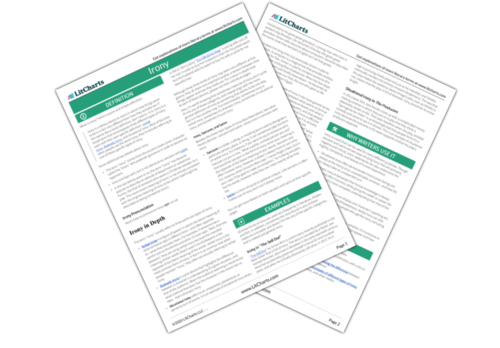
- PDFs for all 136 Lit Terms we cover
- Downloads of 1953 LitCharts Lit Guides
- Teacher Editions for every Lit Guide
- Explanations and citation info for 41,188 quotes across 1953 books
- Downloadable (PDF) line-by-line translations of every Shakespeare play
- Dramatic Irony
- Verbal Irony
- Connotation
- Extended Metaphor
- Climax (Plot)
- Anachronism
- Tragic Hero
- Parallelism

VIDEO COURSE
Finish your draft in our 3-month master class. Sign up now to watch a free lesson!
Learn How to Write a Novel
Finish your draft in our 3-month master class. Enroll now for daily lessons, weekly critique, and live events. Your first lesson is free!

Guides • Perfecting your Craft
Posted on Sep 02, 2022
Situational Irony: 7 Examples That Will Make you Think
Situational irony takes place when, in a twist of events, the outcome of a situation significantly differs from a character’s expectations about it. Depending on whether the outcome is positive or negative, this can lead to humorous or tragic results. For example, a detective is appointed to solve a crime, but later is found guilty of committing it 一 the paradox of the situation is, to say the least, amusing.
To better understand this literary device , let’s look at some situational irony examples from ancient and modern literature.
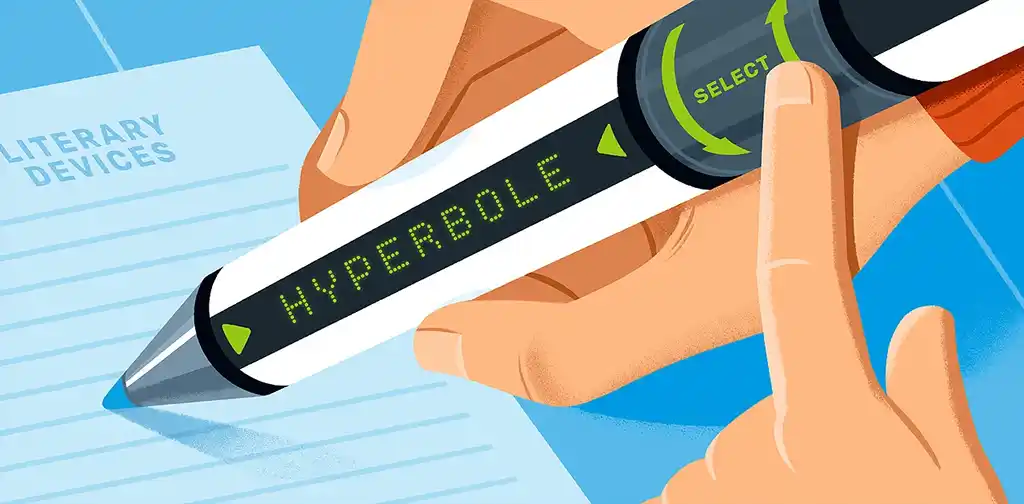
FREE RESOURCE
Literary Devices Cheatsheet
Master these 40+ devices to level up your writing skills.
The Gift of the Magi by O. Henry
In "The Gift of the Magi" by O. Henry, married couple James and Della cannot afford to buy each other special gifts for Christmas, but they independently decide to go out of their way and surprise each other anyway. Della decides to sell her hair (which her husband adores) to buy him a watch chain. At the same time, James chooses to sell his watch to buy her a set of ornamental hair combs.
In this classic example, what’s ironic is that both characters sacrifice something meaningful to surprise their partners and make them happy, but end up disappointed after losing something valuable and receiving an unwanted gift. This double irony results in a sad effect that brings the reader closer to both characters, as their dedication to each other overshadows their unfortunate gift exchange.
Antigone by Euripides
Antigone , Euripides's sequel-of-sorts to Oedipus Rex , takes place in Ancient Thebes, where Antigone’s brothers Eteocles and Polynices both died, fighting each other in battle. Antigone’s mission is to bury Polynices, whom the new king Creon refuses to bury because he sees him as a traitor for joining a foreign army.
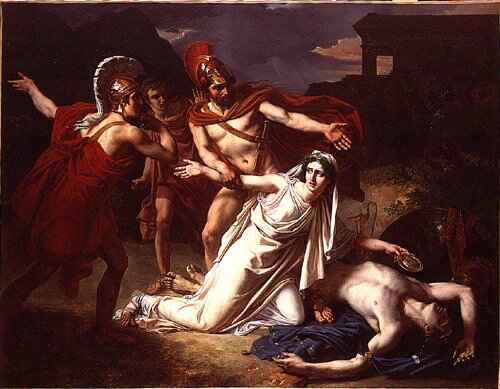
Antigone can distinguish between city law and the expectations of the gods, and knowing that Polynices must receive funeral rites to enter the Underworld, decides to bury him anyway. Creon discovers her plan and has her arrested and sentenced to death. His son, who is betrothed to Antigone, begs his father to spare her soul 一 but he ignores him and laughs it off.
Tiresias, a blind seer, warns Creon about the dreadful consequences of his disrespect for the dead, saying the Gods are angry. Worried, Creon decides to reverse his decisions 一 but it’s too late. A cascade of death curses him with pain: Antigone is found dead, which leads Haemon to kill himself, which brings his mother Eurydice (Creon’s wife) to commit suicide, too.
The irony of the situation is that Creon’s arrogance and disrespect for the dead led his closest family members to tragically die. Even more ironic is the fact that the blind seer is actually the character with a clairvoyant understanding of events, seeing things exactly as they are despite his physical blindness. In a devout society, this situational irony served as a powerful reminder to obey and honor the gods, or pay the cost.
Which famous author do you write like?
Find out which literary luminary is your stylistic soulmate. Takes one minute!
The Necklace by Guy de Maupassant
Set in 1884 Paris, 'The Necklace' by Guy de Maupassant tells the story of Matilda, a middle-class woman who desires jewels and fine clothing. When her husband comes home with an invitation to a ball at the Palace of Ministry, she turns it down 一 complaining she has nothing to wear. He sacrifices his savings to buy her an appropriate outfit, but she’s then faced with her lack of jewelry, so she borrows a diamond necklace from a wealthier friend.
At the ball, Matilda enjoys the life she always dreamed of, but also loses the necklace. To return it, she and her husband buy another one using their inheritance money and taking up a loan. They then start working two jobs to repay the debt, considerably lowering their living standards. Many years later, they discover that the original necklace was fake and worthless.
It’s hard to miss the situational irony in this classic short story . Instead of helping her climb the social ladder, Matilda’s unhealthy obsession with wealth and status leads her and her husband to absolute misery. Both humorous in its reversal of the readers’ expectations and serious in warning against greed, the story uses irony to ask readers if the things they want really matter.
Convenience Store Woman by Sayaka Murata
Convenience Store Woman by Sayaka Murata tells the story of Keiko Furukura, an introvert and outsider who seemingly finds her calling when she lands a job at a convenience store. In the regimented environment of a konbini , guided by manuals and clear rules, she learns exactly what to do to be liked and respected 一 and what it means to have a sense of purpose. Many years later, having been pressured by family and colleagues to improve her position in life, she quits her job and gets married — but soon enough realizes that her true place is at the convenience store where she returns to work.

Keiko’s situation is highly ironic: she only feels empowered, fulfilled, and liberated as a convenience store employee, an alienating job that demands she set any sense of personality aside. Instead, she finds society’s pressures to pursue individuality repressing, in the same way that most people find jobs like hers strip them of their freedom. By turning society’s standards on their head, Murata uses situational irony to create an unexpected, humorous, and thought-provoking effect, really getting readers to reconsider their definition of ‘normal’.
Erasure by Percival Everett
The book Erasure by Percival Everett tells the story of Thelonious “Monk” Ellison, an educated man who wants to write fiction. Still, no publisher supports him because, as a Black author, they expect him to write about the hardships of Black people.
Enraged, Monk decides to write a parody novel narrating the “life in the ghetto” of a troubled Black young man, to expose racial stereotyping in publishing. Ironically, the novel gets picked by a major publisher and becomes a success. Monk finds himself on a book tour promoting a story that perpetuates the stereotypes (and supports the industry) he’s fighting against.
Everett makes the reader empathize with Monk’s frustration, then uses irony to highlight how difficult it is to change the entrenching system we live in 一 even with good intentions. More importantly, the comic nature of the book contrasts with the serious issue at hand, posing the question of whether a text can be valued for its content regardless of an author's race.
Harry Potter and the Deathly Hallows by J.K. Rowling
Throughout the seventh book of the Harry Potter series , readers follow Harry on his quest to find and destroy Voldemort’s six Horcruxes. At the novel's end, we discover that there is a seventh Horcrux, so to speak, and it's Harry himself.
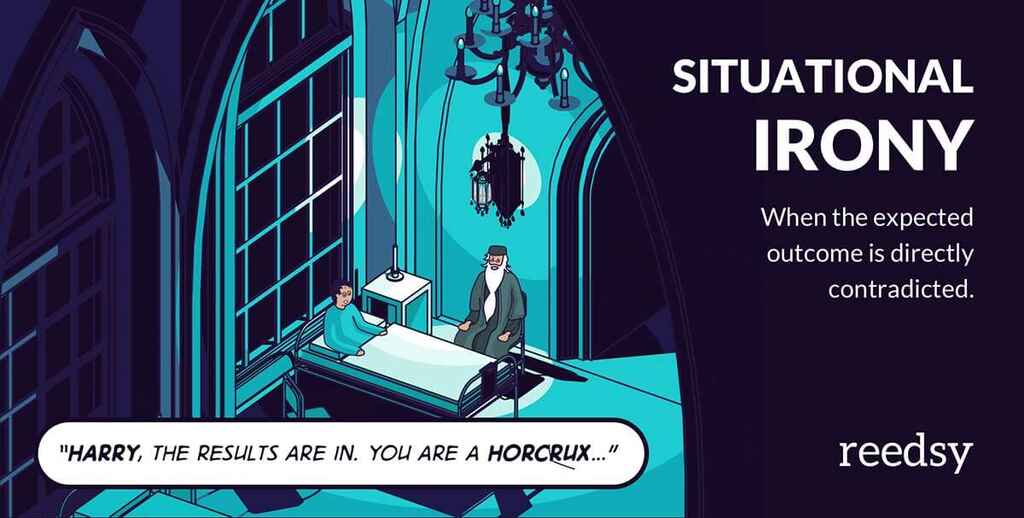
This unexpected twist also comes with the ironic realization that Harry must sacrifice himself for Voldemort to die. So he willingly goes to meet Voldemort — and his own death. But when Voldemort uses the killing curse on Harry, it has the opposite of his desired effect. Harry lives while the Horcrux dies, bringing Voldemort closer to his greatest fear: mortality.
In this way, Harry being a Horcrux is a double case of situational irony. Harry believes he must die to vanquish his enemy, whereas Voldemort thinks he is killing Harry, but he’s actually killing himself. With an unexpected turn of events, Rowling solves a high-stakes conflict, built up across several books, giving the readers the payoff (and sense of relief) they were looking for.
A Lamb to the Slaughter by Roald Dahl
In this typically twisty short story from Roald Dahl, a betrayed housewife kills her husband with a frozen leg of lamb. When the cops arrive at her place to solve the crime, she cooks the lamb and feeds it to them, effectively making them dispose of the evidence.
It’s a double case of situational irony: when you expect the housewife to be heartbroken about her husband's desire to separate, she abruptly kills him. When you expect her to break down and confess her crime, she calls the Police and blatantly serves them the incriminated weapon.
By carefully executing twists and turns, the author emotionally engages the reader, provoking a mixed reaction of disbelief and excitement. Since situationally ironic storylines inherently possess an element of surprise, they're common in the thriller , crime, and mystery genres.
Overall, you can use situational irony in different ways: to deliver your story’s message in unexpected ways, lightheartedly invite readers to reflect on serious matters, or entertain them as they observe a character's expectations clash with reality.
Next up, we'll be looking at some examples of dramatic irony 一 which will complete your knowledge of the types of ironies!
Join a community of over 1 million authors
Reedsy is more than just a blog. Become a member today to discover how we can help you publish a beautiful book.
How good are your theme-detecting skills?
Take our 1-minute quiz to find out.

1 million authors trust the professionals on Reedsy. Come meet them.
Enter your email or get started with a social account:
Definition and Examples of Situational Irony
Merlyn Severn / Picture Post / Getty Images
- An Introduction to Punctuation
- Ph.D., Rhetoric and English, University of Georgia
- M.A., Modern English and American Literature, University of Leicester
- B.A., English, State University of New York
Situational irony is an event or occasion in which the outcome is significantly different from what was expected or considered appropriate. Also called irony of fate, irony of events , and irony of circumstance .
Dr. Katherine L. Turner characterizes situational irony as "a long con—a ruse taking place over time. Participants and onlookers do not recognize the irony because its revelation comes at a later moment in time, the unexpected 'twist.' In situational irony, the anticipated outcome contrasts with the end result" ( This Is the Sound of Irony , 2015).
"The essence of situational irony," says J. Morgan Kousser, "lies in an apparent contradiction or incongruity between two events or meanings, a contradiction resolved when the literal or surface meaning turns out to be one of appearance only, while the initially incongruous meaning turns out to be the reality" ( Region, Race, and Reconstruction , 1982).
Also Known As: Irony of situation, irony of events, irony of behavior, practical irony, irony of fate, unintended consequences, irony of existence
Examples and Observations
- " Situational irony , sometimes called irony of events , is most broadly defined as a situation where the outcome is incongruous with what was expected, but it is also more generally understood as a situation that includes contradictions or sharp contrasts...An example would be a man who takes a step aside in order to avoid getting sprinkled by a wet dog, and falls into a swimming pool." (Lars Elleström, Divine Madness . Bucknell University. Press, 2002)
- "Not all forms of irony are conscious, intentional or planned. For example, irony also occurs serendipitously through unintended and unexpected circumstances or through the evolution of situations. Situational irony focuses on the surprising and inevitable fragility of the human condition, in which the consequences of actions are often the opposite of what was expected." (David Grant, The Sage Handbook of Organizational Discourse . Sage, 2004)
- "[I]magine that a person has invested a large sum of money in an apparently reliable company while mocking others for failing to take the same opportunity. Then, the company turns out to be a failure and all the investor's money is lost. The situation is ironical for two reasons in combination: (1) there is a mismatch between the investor's certainty on the solvency of the company and the real situation; (2) after getting ruined, the investor's unwise mockery of those who did not want to undertake any risk makes the investor look foolish. We may observe that, in situational irony , just like in verbal irony , there is incongruity between intention and effect or between belief and reality." (Francisco José Ruiz de Mendoza Ibáñez and Alicia Galera Masegosa, Cognitive Modeling: A Linguistic Perspective . John Benjamins, 2014)
Situational Irony in A.E. Housman's Poem "Is My Team Ploughing?"
“Is my team ploughing, That I was used to drive And hear the harness jingle When I was man alive?”
Aye, the horses trample, The harness jingles now; No change though you lie under The land you used to plow.
“Is football playing Along the river shore, With lads to chase the leather, Now I stand up no more?”
Aye, the ball is flying, The lads play heart and soul; The goal stands up, the keeper Stands up to keep the goal.
“Is my girl happy, That I thought hard to leave, And has she tired of weeping As she lies down at eve?”
Ay, she lies down lightly, She lies not down to weep: Your girl is well contented. Be still, my lad, and sleep.
“Is my friend hearty, Now I am thin and pine, And has he found to sleep in A better bed than mine?”
Yes, lad, I lie easy, I lie as lads would choose; I cheer a dead man’s sweetheart, Never ask me whose. (A.E. Housman, "Is My Team Ploughing?" A Shropshire Lad , 1896)
Situational Irony in Creative Nonfiction
"Situational irony abounds in fiction, but it's also a major component to many non- fiction narratives —if you think about the popular 'storm' books from a couple of years ago, Sebastian Junger's Perfect Storm and Erik Larson's Isaac's Storm , both accounts of these terrible hurricanes deal with the all-too-human disinclination to take nature seriously. 'Hey, how bad can some wind and rain be? Not going to stop me from raking in the dough.'" (Ellen Moore and Kira Stevens, Good Books Lately . St. Martin's Press, 2004)
The Irony of War
"Every war is ironic because every war is worse than expected. Every war constitutes an irony of situation because its means are so melodramatically disproportionate to its presumed ends." (Paul Fussell, The Great War and Modern Memory . Oxford University Press, 1975)
Incongruity in Situational Irony
- " Situational irony entails a certain incongruity between what a person says, believes, or does and how, unbeknownst to that person, things actually are. [In Sophocles' tragedy Oedipus Rex ] Oedipus vows to discover Laius' murderer, unaware that Laius was his father and that he himself is guilty of patricide. Whatever the precise nature of the incongruity involved in situational irony, verbal and situational irony loosely share a conceptual core of incongruity, often tending toward polar opposition, between two elements, such as a semblance of things and reality. " Dramatic irony may be further distinguished as a type of situational irony; it is simply when situational irony occurs in a drama. The incongruity is between what a dramatic character says, believes, or does and how unbeknownst to that character, the dramatic reality is. The example in the preceding paragraph is, then, specifically of dramatic irony." (David Wolfsdorf, Trials of Reason: Plato and the Crafting of Philosophy . Oxford University Press, 2008)
- "A Wimbledon commentator may say, 'Ironically, it was the year he was given a wild-card entry, and not as a seeded player, that the Croatian won the title.' The irony here refers, like linguistic irony , to a doubleness of sense or meaning. It is as though there is the course of events or human intentions, involving our awarding of rankings and expectations, that exists alongside another order of fate beyond our predictions. This is an irony of situation , or an irony of existence." (Claire Colebrook, Irony . Routledge, 2004)
The Lighter Side of Situational Irony
Sheldon: So this is how it ends: with cruel irony. Just as I make the commitment to preserving my body, I am betrayed by my appendix, a vestigial organ. Do you know the original purpose of the appendix, Leonard?
Leonard: No.
Sheldon: I do, and yet I am doomed while you live on.
Leonard: Funny how things work out, isn't it? (Jim Parsons and Johnny Galecki in "The Cruciferous Vegetable Amplification." The Big Bang Theory , 2010)
- Figure of Speech: Definition and Examples
- The Top 20 Figures of Speech
- Definition and Examples of Dramatic Irony
- Definition and Examples of Irony (Figure of Speech)
- What Is Rhetorical Irony?
- 100 Awfully Good Examples of Oxymorons
- Verbal Irony - Definition and Examples
- Understatement
- The Four Master Tropes in Rhetoric
- Definition and Examples of Sarcasm
- Conditional Clause in Grammar
- Understanding Subtext
- What Is a Soliloquy? Literary Definition and Examples
- Definition and Examples of Anticlimax in Rhetoric
- Mixed Metaphor
- Figure of Thought in Rhetoric
Grammarflex

Situational Irony (Meaning & Examples)
- November 19, 2023
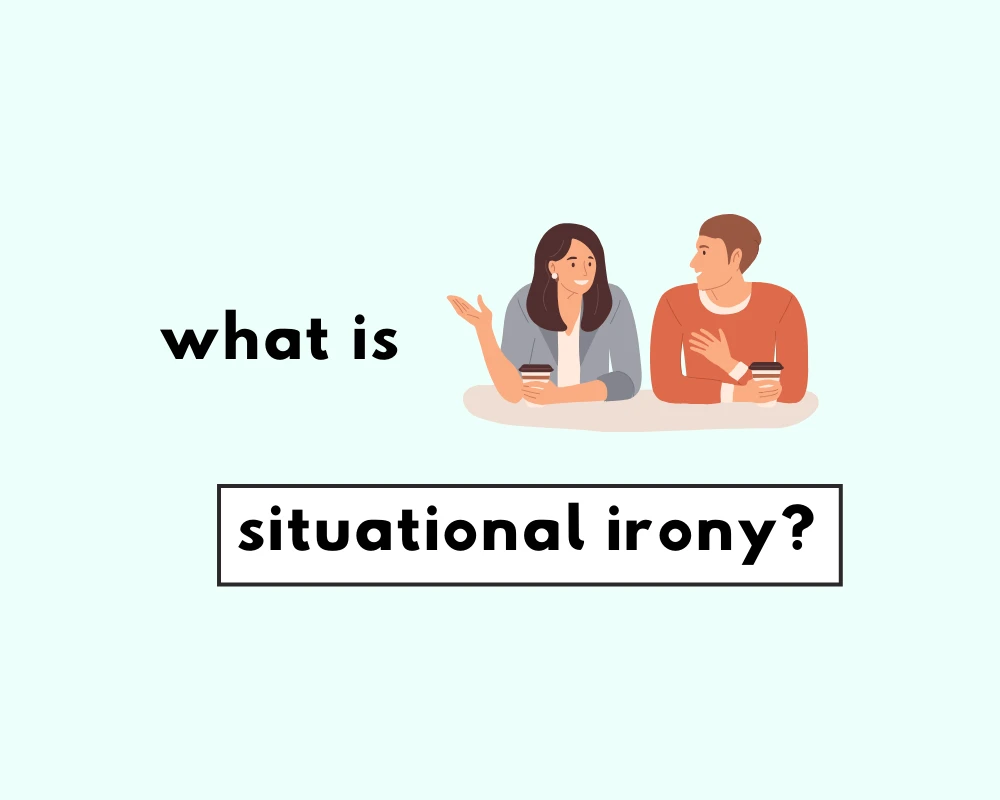
What is situational irony?
A fire station burns down.
Someone on social media complains about social media.
A grocery store runs out of food.
Would you say that what each of these scenarios have in common is that they’re i-r-o-n-i-c , you’d be right. More specifically, they’re all demonstrations of situational irony; which is the topic of this post. So, what is irony, and what is not irony? Let us discern the difference, below.

The simple explanation of “irony” `
If you visit the dictionary, they describe irony as something like, “ a situation in which something which was intended to have a particular result has the opposite or a very different result”.
A more forceful way of putting it is that irony occurs when the result or outcome differs entirely or starkly opposes what’s expected, given the scenario (wither fictional or real).
Because irony occurs in regular life, speech and literature, there are three different types we categorize them into:
- Situational irony ; (a literary device where a marked contrast between what’s expected to take place vs. what, in fact, takes place i..e, reality). It’s a literary curveball, so to speak.
- Dramatic irony
- Verbal irony
Types of situational irony
Also Known As: Irony of situation, irony of events, irony of behavior, practical irony, irony of fate, unintended consequences, irony of existence. There are four types of situational irony: cosmic irony , poetic irony , structural irony , and historical irony .
Cosmic irony
Also called irony of fate or circumstance , is when a higher power, (e.g., a god, magic or fate), intervenes resulting in ironic situations.
An example of cosmic irony occurs in the film Pulp Fiction by Quentin Tarantino. The two lead characters, Jules and Vincent, are shot at multiple times without getting hit, so inevitably Jules assumes that, “God must have stopped the bullets”, claiming it was a “divine intervention”.
Poetic irony
Also called poetic justice , is when “ virtue is rewarded and misdeeds are punished”. To put it another way: poetic irony or justice is when the characters in the story get what they deserve.
These stories tend to be the most satisfying to watch. Disney movies are big on this type of irony, as is seen in the classic Disney film, The Little Mermaid . In the film, the evil sea-witch, Ursula, eventually is killed as punishment for trying to appoint herself as ruler of the sea.
Structural irony
Structural irony occurs when the narrator of a story has faulty perceptions of reality, or is delusional, ultimately influencing how the story is told/the audience’s understanding of the events.
In F. Scott Fitzgerald’s novel The Great Gatsby is narrated by Nick Carraway, a titular character who becomes friends with Jay Gatsby and observes the events surrounding Gatsby’s pursuit of wealth and love. The structural irony arises from the fact that Nick, the narrator, is an unreliable narrator. He tells the story from his point of view, but the reader gradually becomes aware of Nick’s biases and limited perspective.
Historical irony
Historical irony is when hindsight provides an ironic perspective on an action or stance made in the past. An example of this is when Chinese emperors sought to find an “elixir of mortality” which would make them immortal. As it happened, some of the emperors that drank this elixir would then die from its poisonous effects, since some contained mercury or arsenic.
Situational irony vs. other types of irony
The other main types of irony include verbal irony and dramatic irony. The difference between verbal irony and situational irony is that verbal irony is based on the literal words of what someone says vs. the intended meaning. Figures of speech like sarcasm, understatement or overstatement are all types of verbal irony. An example would be to say “ the weather today is fantastic! “, when it’s actually gloomy and rainy outside. Chances are, the remark means the complete opposite of what is literally being said.
Situational irony is similar to dramatic irony, but the difference is that with situational irony, the reader learns of the events unfolding alongside the characters within the story themselves. With dramatic irony, the audience knows about key elements of the plot before the characters themselves do.
12 examples of situational irony
1. a fire station burning down.
A fire station burning down is a paradigmatic example of situational irony, since it’s the exact opposite of what you’d expect to happen at a fire station.
2. A health nut getting food poisoning
A health who advocates for a strict, organic diet getting food poisoning from contaminated health foods they advocate for. This scenario not only presents a health-conscious individual facing an ironic health crisis but also challenges our assumptions about the correlation between lifestyle choices and well-being.
3. A snowball fight gets cancelled due to too much snow.
This is not fake news:The University of British Columbia, in British Columbia, Canada had to cancel their annual snowball fight because there was too much snow, (making the commute to and from campus, or wherever the fight was to be held, unsafe). They had to postpone the snowball fight to when there was just the right amount of snow.
4. A police officer getting a speeding ticket
A police officer receives a speeding ticket on the way home.
5. The noisy librarian
A librarian who constantly shushes noisy patrons ends up disrupting the silence with an embarrassing, inadvertent loud noise.
More examples of irony that’s situational
6. A marriage counsellor filing for divorce.
7. Running over and killing a squirrel on your way to the vet.
8. A waterpark burning to the ground.
9. A tow truck breaks down.
10. A PETA activist touting a leather purse.
11. A cybersecurity expert gets hacked.
12. A neurosurgeon getting a brain tumor.
13. Pharmaceutical companies getting involved in the substance abuse treatment industry.
Read about other literary devices
- What’s Alliteration?
- What is Irony?
- What is Verbal Irony?
- What is Dramatic Irony?
- Wikipedia contributors. “Chinese alchemical elixir poisoning.” Wikipedia, The Free Encyclopedia . Wikipedia, The Free Encyclopedia, 10 Sep. 2023. Web. 19 Nov. 2023.
Recent Posts

Is it Nerve-Racking, Nerve-Wrecking or Nerve-Wracking?
Which is correct: nerve-wracking or nerve-racking? To describe something as extremely irritating, annoying, or trying; (as in, a nerve-racking day; or a nerve-racking noise), we

“Beck and Call” or “Beckon Call”? Which is Correct?
Meaning of ‘beck and call’ ‘To be at someone’s beck and call‘ is an idiomatic expression that describes being immediately available, or ready to be

What’s the Meaning of the Word “Connotation”?
Ever catch bad vibes from a text? Any feeling or internal response you have from the actual words used to is its connotation; which perhaps

What’s the Difference Between Ambiguous & Ambivalent?
Are ambiguous and ambivalent the same? Something ambiguous (an adjective) is unclear, vague and open to different interpretations. To be ambivalent (also an adjective) means

When to Use Have or Had? (Explained with Examples)
When should you use “have” or “had”? When is it correct to use have, has, or had? Phrased differently, what’s the past tense of have?

What’s the Past Participle? (Explanation & Usage)
The past participle is a form of a verb that can appear as an adjective, or be used to form specific tenses and the passive

Emigrate vs. Immigrate (Meaning + Examples)
Meaning of emigrate vs. immigrate To immigrate is the verb form of the noun immigrant; referring to someone that’s moved away from their birth country

Recurring vs. Reoccurring (Correct Usage, + Examples)
Did you have a recurring or reoccurring dream? If you’re finding the difference between these two words befuddling, then this post is for you. How

What’s the Difference Between Nevertheless vs. Nonetheless?
Nevertheless vs. nonetheless Nevertheless and nonetheless are synonyms that both belong to the same part of speech; i.e, they’re compound adverbs that express contrast. There

What is Situational Irony? Definition, Examples of Situational Irony in Literature
Home » The Writer’s Dictionary » What is Situational Irony? Definition, Examples of Situational Irony in Literature
Definition of situation irony? Situational irony is a type of irony where there is a discrepancy between what is expected to happen versus what actually happens in a situation.
What is Situational Irony?
Situational irony occurs when the unexpected happens in the plot. Authors often set up stories in a way where the reader has an expectation of what’s going to happen; however, when a twist occurs and the reality differs from the expectation, this is known as situational irony.
Here are some examples of situational irony:

In O. Henry’s The Gift of the Magi , Della cuts off her hair to buy Jim a new fob chain for his prized possession, watch. When she presents this gift to him, we expect him to be overwhelmed with joy. Instead, Jim is shocked because he has sold his pocket watch in order to buy her new combs for her long hair. Through these sacrifices, the characters realize that the most important thing is their love for one another.
Situational Irony vs. Dramatic and Verbal Irony

Verbal irony is the discrepancy between what someone says versus their intended meaning:
In Edgar Allan Poe’s “The Cask of Amontillado,” the murderer, Montresor, often speaks using verbal irony when talking to his victim, Fortunato. He states that he “drink[s] to [his] long life.” However, this is ironic because he is intending on killing him in just a few moments.
Dramatic irony is where there is a discrepancy between what the reader knows versus what the characters know in the story:
In Edgar Allan Poe’s “The Tell-Tale Heart,” the readers know that the narrator has just committed a murder and placed the dismembered body under the floorboards; however, the policeman questioning him are unaware of this information.
The Function of Situational Irony
The purpose of situation irony is to create a surprised effect for the reader. Many times we enjoy reading stories where the unexpected occurs. Many times we refer to this as a twist ending.
How Situational irony is Used in Literature

In Neil Simon’s modern drama Lost in Yonkers , the main character, Eddie, must try to mend the broken relationship with his harsh mother after his wife dies in order to secure a home for his sons while he travels for work. His younger, timid sister, Bella, sits quietly as the two seem to be unable to settle their differences. However, the situational irony occurs when the timid Bella stands up to her domineering mother and says the boys will be welcome in their home.
In William Shakespeare’s Romeo and Juliet , Romeo declares that while he will go to the Capulet’s ball, he will only attend to look at the fair Rosaline who has denied his declaration of love. The audience expects him to go and mope during this party; however, it is there that he immediately forgets about Rosaline and falls in love with Juliet.
Define situational irony: In summation, situational irony occurs when what is expected in a situation differs from what actually happens.
Final example:
In Nicole Yoon’s Everything, Everything , the protagonist’s mother has diagnosed her with an allergy to the world. This has led to her mother refusing her daughter contact with others outside of their home. Such restriction is challenged when the protagonist falls in love with the boy next door and desires to leave the home. After much research, the protagonist and reader discover that the reality is she is not allergic to the world, but instead, her mother has concocted this diagnosis in order to keep her daughter “safe.” This is situational irony because we expect mothers to tell the truth and protect their children; however, in this situation, her mother was harming her child.
Literary Devices
Literary devices, terms, and elements, definition of irony, types of irony, verbal irony.
Verbal irony can also consist of “ironic similes”, which are comparisons in which the two things are not alike at all. For example, “as soft as sandpaper” or “as warm as ice.” These similes mean that the thing in question is actually not soft or warm at all. The author Daniel Handler (who writes with the pen name Lemony Snicket) takes ironic similes to an extreme by qualifying them so they actually become real comparisons. For example: “Today was a very cold and bitter day, as cold and bitter as a cup of hot chocolate, if the cup of hot chocolate had vinegar added to it and were placed in a refrigerator for several hours.”
Dramatic Irony
Situational irony.
Other types of irony:
Difference between Irony and Sarcasm
Though there are many similarities between verbal irony and sarcasm, they are not equivalent. However, there are many dissenting opinions about how, exactly, they are different. For example, the Encyclopedia Britannica simply explains that sarcasm is non-literary irony. Others have argued that while someone employing verbal irony says the opposite of what that person means, sarcasm is direct speech that is aggressive humor. For example, when Winston Churchill told Bessie Braddock that “I shall be sober in the morning, and you will still be ugly,” he was being sarcastic and not employing any irony.
Common Examples of Irony
Examples of irony in literature.
Romeo and Juliet by Shakespeare
In this famous love story the audience can foresee the tragic ending long before Romeo and Juliet themselves know what’s going to happen. At the end of the play, Romeo finds Juliet and believes her to be dead though the audience knows she’s taken a sleeping potion. Romeo kills himself with this false knowledge. Juliet then wakes up and, finding Romeo truly dead, kills herself as well. This irony example is one of dramatic irony as the audience has more information than the characters.
MARK ANTONY: But Brutus says he was ambitious; / And Brutus is an honourable man.
“The Little Mermaid” by Hans Christian Andersen
Test Your Knowledge of Irony
In Oedipus Rex, Oedipus kills his own father without realizing that the man is actually his father. This act brings on a plague and Oedipus swears that he will murder the man responsible, not knowing that he himself is responsible.
A. The event was very tragic, and thus it was ironic. B. JFK was aware that he was in danger, and thus employed verbal irony when he asserted that Dallas must love him, knowing this wasn’t the case. C. In retrospect, this conversation was ironic because the outcome of the situation was completely at odds with what anyone would have expected to happen. [spoiler title=”Answer to Question #3″] Answer: C is the correct answer.[/spoiler]
27 Situational Irony Examples

Chris Drew (PhD)
Dr. Chris Drew is the founder of the Helpful Professor. He holds a PhD in education and has published over 20 articles in scholarly journals. He is the former editor of the Journal of Learning Development in Higher Education. [Image Descriptor: Photo of Chris]
Learn about our Editorial Process

Situational irony occurs when something happens that is the inverse of what is intended or expected.
It’s human nature to find irony a little funny. We tend to laugh when the unexpected occurs. It catches us by surprise and we see humor in the unexpected.
A common example of situational irony is a traffic cop being caught speeding. We see this as ironic because the traffic cop is supposed to enforce the very law that he’s breaking!
Situational Irony Examples
1. A traffic cop gets caught speeding.
2. A brain surgeon needs a lobotomy.
3. A librarian yells across the library: “keep your voices down!”
4. A tailor wears an ill-fitting suit.
5. A man drops his contact lenses and can’t find them because he can’t see.
6. A mortgage broker defaults on his loan.
7. A “family first” politician is caught cheating on his wife.
8. A marriage counselor gets a divorce.
9. A man complains loudly about how everyone around him is too loud.
10. A hunter gets eaten by a bear.
11. A firefighter’s house burns down.
12. A wedding planner’s own wedding turns out to be a disaster.
13. A teacher sends a letter home to parents about the students’ poor spelling, only to have spelling mistakes all through the letter.
14. A lifeguard drowns.
15. A man’s internet breaks during an online job interview for a job as a computer technician.
16. A pilot skillfully crash lands a plane, saving everyone on board, only to get injured as he walks off the plane.
17. A husband complains to his wife about how she never does anything for him while she’s cooking him dinner.
18. A man is afraid of flying so he drives instead, only to get injured in a car crash.
19. An anti-corruption politician gets caught accepting dirty money.
20. A socialist politician turns out having three holiday homes in Canada.
21. A free speech warrior sues someone for saying something mean.
22. A 24/7 diner is closed.
23. A tow truck gets into a car crash.
24. A prison guard returns to his prison – as an inmate!
25. A butcher turns out to be a vegan.
26. A man impatiently explains to a woman that “mansplaining” means “man explaining”.
27. A dolphin is found washed up on the beach. The autopsy finds it died from drowning.
Situational Irony in Film and Literature
1. the sixth sense.
In The Sixth Sense , the main character is a boy who can see dead people. He seeks help from a therapist who tries to talk him through all of his problems.
The boy and his mentor develop a close relationship. The irony occurs when a twist at the end makes us gasp. It turns out that the mentor himself is a dead person and nobody can see him (except for the boy). The intended audience isn’t privy to this issue until right at the end, but when we finally figure it out, everything suddenly makes sense.
It’s ironic because the therapist, who is skeptical of the boy’s claims that he sees dead people, suddenly realizes that he is, in fact, dead.
2. Romeo and Juliet
In Romeo and Juliet , Romeo attends a ball to see a lady, Rosalyn, he thought he was in love with.
But at the ball, Romeo sees Juliet, a beautiful woman who he falls head over heels for. Here, the irony is that Romeo turned up for one thing and left with something else completely. It’s not only something unexpected, the outcome is the opposite of what he expected.
This twist is a form of situational irony. What we expected didn’t occur, and something unexpected occurred instead.
3. Planet of the Apes
In Planet of the Apes , an astronaut flies his plane into an unknown planet where apes rule the world. Humans are on this planet, but they’re oppressed and enslaved.
The astronaut struggles to survive in this unknown world where everything is upside down. He wants desperately to get back to earth.
The situational irony occurs right at the end of the film when the astronaut stumbles upon a buried statue. It’s the statue of liberty.
Suddenly, the astronaut finds out that he’s been on earth all along.
This is situational irony because the situation isn’t what we first thought. It’s ironic that he embarked upon a whole journey to get back to earth only to learn that he was here all along.

Situational Irony in Real Life
1. fire station burns to the ground.
In 2021, a fire station in Ontario, Canada, burned to the ground . The fire engines were inside the fire hall when the fire broke out and were burned as well.
A neigboring fire brigade had to come to put out the fire.
This is an example of situational irony because the fire brigade’s job is to put out fires. They’re the last people you would expect to have to deal with a fire in their own home!
2. Police officer gets Convicted
In 2022, a Calgary police officer was convicted for conducting an “indecent act” while off duty.
This example of situational irony occurs far too often. And it doesn’t just happen when they’re off duty. It’s even more ironic when police are caught on body cam breaking the law while enforcing the law against others!
This is obvious irony that the person whose job is to enforce the law ends up being the person who breaks it.
Other Types of Irony
Situational irony.
Situational irony occurs when something unexpected occurs in a scenario. It’s a type of irony that’s common in situational comedies like the classic Seinfeld .
The show sets up a situation then creates humor out of it by making relatable or unexpected events occur. Audiences laugh and cringe at the scenario. They can either see themselves doing this silly, ironic, thing; or, they laugh because the same characters continue to get themselves into hilarious and ironic twists in otherwise everyday situations.
As we have seen above, situational irony occurs in real life as well as in film. By contrast, dramatic irony tends to be (but isn’t always) a literary tactic rather than a real-life situation.
Dramatic Irony
Dramatic irony occurs when the audience knows more than the character in a storyline. This is a method used in storylines to create suspense and build tension.
An example of dramatic irony occurs in Romeo and Juliet when the audience knows Juliet isn’t dead, she’s just in a coma. But Romeo has no idea.
So, Romeo proceeds to take his own life out of grievance. The audience is worried, shocked and saddened: they know that Romeo should just wait for her to wake up. It’s ironic that Romeo is doing this, particularly because he’s ruining their chances of being happy together as a couple. If only he had the whole truth!
Verbal Irony
Verbal irony occurs when someone says something that they don’t truly believe.
Politicians are experts at using verbal irony with a straight face.
For example, a politician stands up and advocates for lower taxes even though he doesn’t really want them. He’s lying. Je and his confidantes know he doesn’t truly believe what he’s saying.
The people in-the-know think it’s ironic that the politician is saying this. They all know he doesn’t really believe it! It’s ironic that he’s up there saying one thing when, in truth, he believes the complete opposite.
For more, see my 12 types of irony article.
Situational irony is a great literary technique for writers and film makers. It causes the audience to laugh and draws them into the storyline. It can also improve retention on videos (e.g. YouTube videos!). The other types of irony (verbal and dramatic) are similar but slightly different and can be used in their own ways in literature and film.

- Chris Drew (PhD) https://helpfulprofessor.com/author/chris-drew-phd/ 19 Top Cognitive Psychology Theories (Explained)
- Chris Drew (PhD) https://helpfulprofessor.com/author/chris-drew-phd/ 119 Bloom’s Taxonomy Examples
- Chris Drew (PhD) https://helpfulprofessor.com/author/chris-drew-phd/ All 6 Levels of Understanding (on Bloom’s Taxonomy)
- Chris Drew (PhD) https://helpfulprofessor.com/author/chris-drew-phd/ 15 Self-Actualization Examples (Maslow's Hierarchy)
Leave a Comment Cancel Reply
Your email address will not be published. Required fields are marked *
Definition of Irony
Common examples of irony, verbal irony, situational irony, examples of irony in plot, real life examples of irony, difference between verbal irony, dramatic irony, and situational irony, writing irony, plot device, method of reveal, difference between irony and sarcasm, use of irony in sentences, examples of irony in literature, example 1: the necklace (guy de maupassant).
“You say that you bought a necklace of diamonds to replace mine?” “Yes. You never noticed it, then! They were very like.” And she smiled with a joy which was proud and naïve at once. Mme. Forestier, strongly moved, took her two hands. “Oh, my poor Mathilde! Why, my necklace was paste. It was worth at most five hundred francs!”
Example 2: Not Waving but Drowning (Stevie Smith)
Nobody heard him, the dead man, But still he lay moaning: I was much further out than you thought And not waving but drowning .
Example 3: A Modest Proposal (Jonathan Swift)
A child will make two dishes at an entertainment for friends; and when the family dines alone, the fore or hind quarter will make a reasonable dish, and seasoned with a little pepper or salt will be very good boiled on the fourth day, especially in winter .
Example 4: 1984 by George Orwell
War is Peace ; Freedom is Slavery and Ignorance is Strength .
Synonyms of Irony
Related posts:, post navigation.

Table of Contents
Introduction, what is irony, types of irony, why do writers use irony, examples of irony, examples of irony in literature.
OEDIPUS Then I will start afresh, and once again shed light on darkness. It is most fitting that Apollo demonstrates his care for the dead man, and worthy of you, too. And so you’ll see how I will work with you, as is right, seeking vengeance for this land, as well as for the god. This polluting stain I will remove, not for some distant friends, but for myself. For whoever killed this man may soon enough desire to turn his hand to punish me in the same way, as well. Thus, in avenging Laius, I serve myself. But now, my children, quickly as you can stand up from these altar steps and raise your suppliant branches. Someone must call the Theban people to assemble here. I’ll do everything I can. With the god’s help this will all come to light successfully, or else will prove our common ruin. From “Oedipus Rex” by Sophocles’
Sophocles’ “ Oedipus Rex ” is an example of dramatic irony . The audience knows that Oedipus is the murderer he is trying to find, while Oedipus remains unaware of his true identity. This creates suspense and tension as the audience anticipates the tragic revelation.
“It is a truth universally acknowledged, that a single man in possession of a good fortune, must be in want of a wife.” From “Pride and Prejudice” by Jane Austin
All of a sudden she discovered, in a black satin box, a superb diamond necklace, and her heart began to beat with an immoderate desire. Her hands trembled as she took it. She fastened it round her throat, outside her high-necked waist, and was lost in ecstasy at her reflection in the mirror. Then she asked, hesitating, filled with anxious doubt: “Will you lend me this, only this?” “Why, yes, certainly.” She threw her arms around her friend’s neck, kissed her passionately, then fled with her treasure. From “ The Necklace ” by Guy de Maupassant
Mathilde Loisel, the main character in Guy de Maupassant’s “ The Necklace ,” borrows a diamond necklace from a friend to enhance her appearance at a luxurious ball, aiming to appear affluent. However, her plans take a tragic turn as she loses the jewels, leading to financial ruin for both her and her husband.
- Features for Creative Writers
- Features for Work
- Features for Higher Education
- Features for Teachers
- Features for Non-Native Speakers
- Learn Blog Grammar Guide Community Events FAQ
- Grammar Guide
20 Irony Examples: In Literature and Real Life

Millie Dinsdale

Irony occurs when what happens is the opposite from what is expected.
Writers use irony as a literary technique to add humor, create tension, include uncertainty, or form the central plot of a story.
We will be looking at the four types of irony (three common and one uncommon) and providing examples and tips to help you identify and use them in your work.
Quick Reminder of What Irony Is
Irony examples in literature, irony examples in real life, which scenario is an example of irony.
Irony is a rhetorical device in which the appearance of something is opposite to its reality .
There are four main types of irony: verbal irony, dramatic irony, situational irony, and Socratic irony . Socratic irony is not a literary device, and therefore we will not be looking at examples, but it is worth being aware of.
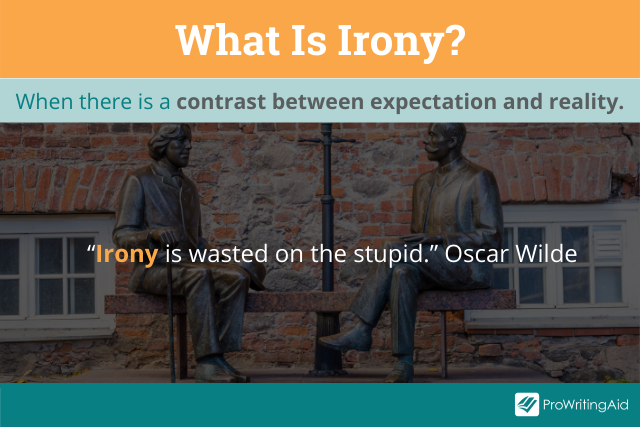
- Verbal Irony is when a speaker says one thing but means something entirely different. The literal meaning is at odds with the intended meaning.
- Dramatic Irony is when the audience knows something that the characters don’t.
- Situational Irony is when what happens is the opposite of what you expect.
- Socratic Irony is when a person feigns ignorance in order to get another to admit to knowing or doing something. It is named after Socrates, the Greek philosopher, who used this technique to tease information out of his students.
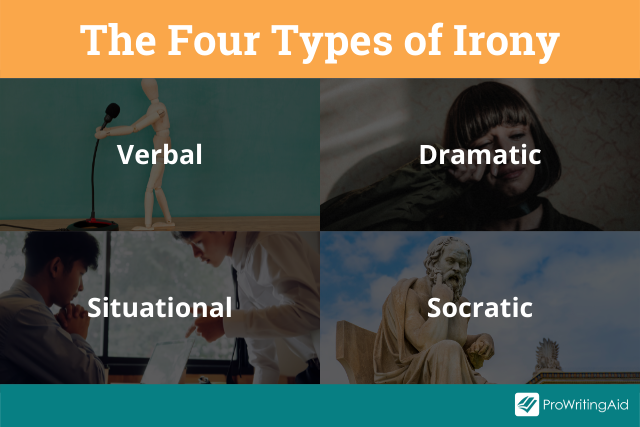
Why is irony important to understand? Along with being a key rhetorical device, irony can also be very effective when used correctly in writing.
To demonstrate this fact we have selected ten examples of irony usage from popular literature. Warning: this list includes a few spoilers.
1) The main characters’ wishes in L. Frank Baum’s The Wonderful Wizard of Oz are a perfect example of situational irony .
The characters go on a quest to fulfill their hearts’ desires and instead of doing so they realize that they already had what they wanted all along. It is unexpected because the reader might assume that all of their desires will be gifted to the four main characters but, in the end, it’s unnecessary.
2) The conclusion between the two primary opponents in The Night Circus contains a large amount of situational irony .
The reader is led to expect that either Marco or Celia will win but, in the end, they both end up working together to keep their creation alive. The competition is not as black and white (pardon the pun) as it initially seems.
3) The Strange Case of Dr Jekyll and Mr Hyde is full of verbal irony . A great example of this is when Dr Jekyll says “I am quite sure of him,” when referring to Mr Hyde.
This is verbal irony because the reader finds out that Hyde is actually Jekyll’s alter ego, so it would be expected that he knows himself well.
4) Shakespeare creates dramatic irony in the prologue of Romeo and Juliet through the line: “A pair of star-cross’d lovers take their life.”
This well-known example is ironic because the reader knows from the very beginning that their romance will end in death, but they don’t yet know how.
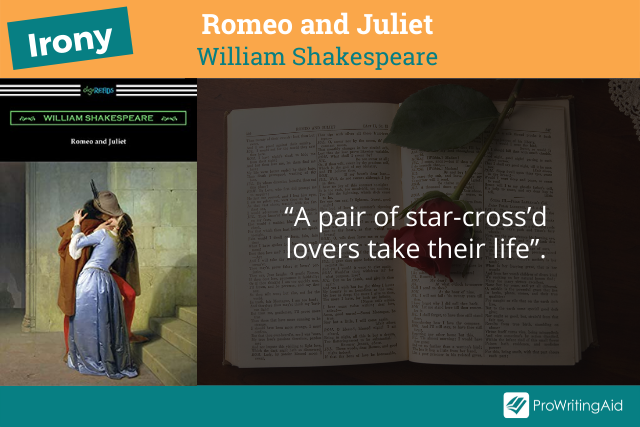
5) Alice’s changing relationship with the Bandersnatch in Alice in Wonderland is situationally ironic .
When we first meet the Bandersnatch, he is ferocious and attempts to harm Alice. When Alice returns his eye, they become friends and the two work together to defeat the Jabberwocky. The audience expects to see an enemy but are instead presented with an ally.
6) George Orwell masters situational irony in Animal Farm through the animals’ endless and fruitless battle to obtain freedom.
All of the animals work together to escape the tyranny of the humans who own them. In doing so they end up under the even stricter rule of the pigs.
7) Roald Dahl’s short story A Lamb to a Slaughter is full of dramatic irony .
A housewife kills her husband with a frozen leg of lamb when he asks for a divorce. The police come looking for evidence and unknowingly dispose of it when they are fed the murder weapon for dinner.
8) The repeated line “May the odds be ever in your favor” in Suzanne Collins’ The Hunger Games is verbally ironic .
Everyone from district 1 through 12 can be offered as a child sacrifice and has a 1/24 chance of surviving. Even if they do survive they are then delivered back under the control of the Capitol, so the odds are in nobody’s favor.
9) The disparity between children and adults in Roald Dahl’s Matilda is situationally ironic .
Most of the adults in Matilda’s life are hot-headed, uneducated, and unreasonable, while she as a six-year old is more mature than most of them. The traditional roles of child and adult are unexpectedly flipped on their heads.
10) The hit-and-run in F. Scott Fitzgerald’s The Great Gatsby is situationally ironic .
Daisy Buchanan kills Myrtle when Myrtle runs in front of Gatsby’s car. It is ironic because Myrtle is Tom Buchanan’s mistress but Daisy does not know this. She unintentionally killed her husband's mistress.
Irony works so well in literature because it is so common in real life. Have you ever found yourself saying “well that’s ironic” to a situation in your life?
You could be talking about verbal, situational, or dramatic irony. Let’s take a look at a few everyday examples of each type.
11) When you find out that your pulmonologist (lung doctor) smokes.
This is situationally ironic because you’d expect this doctor of all people to avoid smoking because they understand all of the risks.
12) When someone falls over for the tenth time while ice-skating and says “I meant to do that.”
This person cannot be intending to fall over all the time but they are using verbal irony to make light of a possibly painful situation.
13) Your dog eats his certificate of dog-training obedience.
You would expect that in the process of having obtained an obedience certificate, the dog would also have learnt not to eat random objects. This is an example of situational irony .
14) The fire hydrant is on fire.
This is situationally ironic because the last thing that you would expect to be on fire is the object that is designed to fight fires. A similar example to this would be if a fire station were on fire.
15) A girl is teasing her friend for having mud on his face but she doesn’t know that she also has mud on her face.
From the point of view of the friend, this is an example of dramatic irony because he knows something that she does not.
16) Your mom buys a non-stick pan but has to throw it away because the label is so sticky she cannot get it off.
You would predict that the pan was completely non-stick but are proven wrong at the first hurdle, which is situationally ironic .
17) When someone crashes into a “thank you for driving carefully'' sign.
The vision of a car crashed into the sign makes it clear that they did not drive carefully at all, which is situationally ironic .
18) Buying your English teacher a mug that reads “your the best teacher ever.”
The poor English teacher may feel like they have failed in their job in this situationally ironic situation where their student has bought them a mug with a grammar mistake.
19) When a child says “I want crisps now!” and the parent says: “Thank you so much for using your good manners.”
The child is being impolite and the parent is not actually congratulating the child on their manners in this example of verbal irony . They mean the exact opposite.
20) You can’t open your new scissors because you don’t have any scissors to cut through the plastic.
This example of situational irony is far too common. In buying scissors, it can be expected that you do not have any, so it is ironic that the packaging is designed for someone who already has a pair.
Are you ready for a quick quiz to test your knowledge of irony? The test is split into the three types of irony.
Which of These Are Examples of Situational Irony?
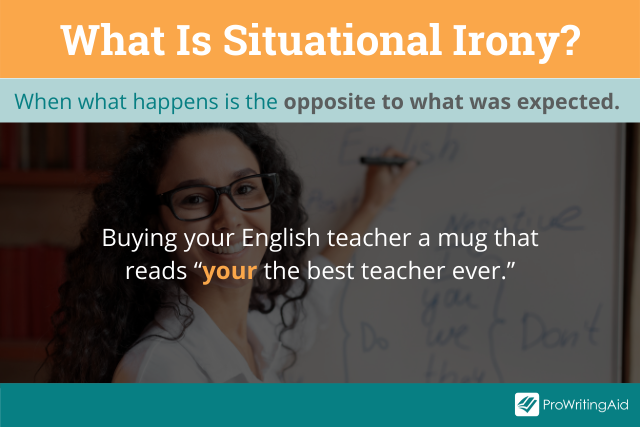
1) A police station is robbed.
2) A child loses his rucksack after being told to take care not to lose it.
3) A person eats sweets while preaching about healthy eating
Only 1) and 3) are examples of situational irony. Sentence 2) is not a situational irony example because it could be expected that the child might lose the rucksack and that is why they were told to take care.
It would, however, be ironic if he subsequently lost his “Most Organized in 2nd Grade” certificate five minutes after being awarded it.
Which of These Are Examples of Verbal Irony?
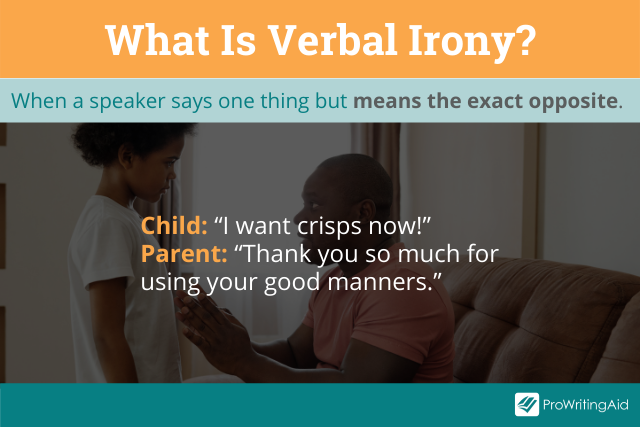
1) Saying “The weather is lovely today” while it is hailing.
2) “Wow that perfume is so lovely, did you bathe in it?”
3) Saying “Thank you so much for your help” after someone has crushed your new glasses while helping to look for them.
Only example 1) is verbally ironic, the other two are sarcastic comments.
Verbal irony and sarcasm are often confused but there is one big difference between them: verbal irony is when what you say is the opposite of what you mean while sarcasm is specifically meant to embarrass or insult someone.
Which of These Are Examples of Dramatic Irony?
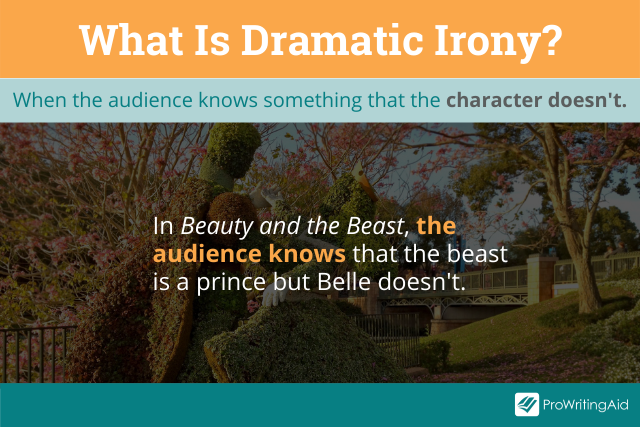
1) A small ship without life boats is stuck in a monumental storm in the middle of the Atlantic.
2) Three characters are killed and a fourth seems to be going the same way.
3) A girl walks down the same alley we have just seen a known murderer walk down.
Only option 3) is an example of dramatic irony because the audience knows that the murderer is down the alley but the girl does not.
Although the other two examples are undeniably dramatic, there is no inherent irony because the audience has no more knowledge about what will happen than those involved.
Why Should You Use Irony in Your Writing?
Irony can be an effective tool to make a reader stop and think about what has just happened.
It can also emphasize a central theme or idea by adding an unexpected twist to the events of the story.
What brilliant examples of irony in literature have we missed? Share your favorites in the comments.
Take your writing to the next level:

20 Editing Tips from Professional Writers
Whether you are writing a novel, essay, article, or email, good writing is an essential part of communicating your ideas., this guide contains the 20 most important writing tips and techniques from a wide range of professional writers..

Be confident about grammar
Check every email, essay, or story for grammar mistakes. Fix them before you press send.
Millie is ProWritingAid's Content Manager. Aa an English Literature graduate, she loves all things books and writing. When she isn't working, Millie enjoys adding to her vast indoor plant collection, dancing, re-reading books by Daphne Du Maurier, and running.
Get started with ProWritingAid
Drop us a line or let's stay in touch via :
- AI in action
- AI in the enterprise
- Humans of AI
Words at work
- Inside Writer
- Content strategy
- Inspiration
– 10 min read
Irony: definition, types, and examples

Holly Stanley
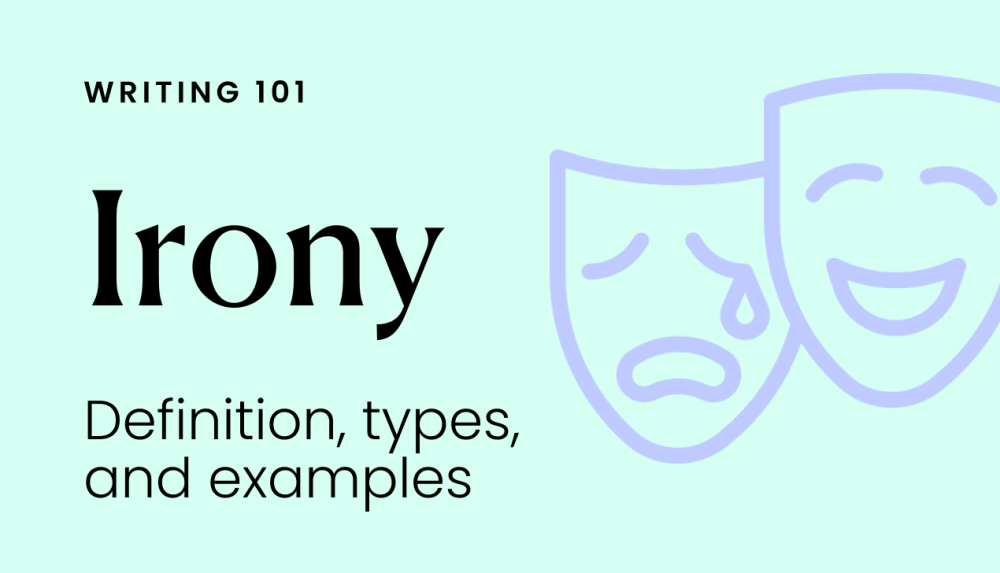
“That’s so ironic!” We’ve all probably uttered these words at some point. In fact, you probably hear “isn’t it ironic?” all the time. Irony is one of the English language’s most misused and abused words.
Irony has become synonymous with coincidence, bad luck, and pleasant surprises. But most things in life aren’t ironic .
So if coincidences, bad luck, and unusual situations aren’t, what is ironic ? Let’s track down the misused word and uncover what situations it pertains to.
Irony definition
The use of irony shows the contrast or incongruity between how things appear and how they are in reality. The remark “how ironic” indicates a meaning that’s the opposite of its precise meaning.
In an ironic phrase, one thing is said, while another thing is meant. For example, if it were a cold, rainy gray day, you might say, “What a beautiful day!” Or, alternatively, if you were suffering from a bad bout of food poisoning, you might say, “Wow, I feel great today.”
These are both examples of irony –– verbal irony, to be precise –– the most frequently used type of irony (more on that later.)
Where does the word irony come from?
Looking at irony’s origins can help with understanding how to best use the word. The word irony comes from the Latin ironia , meaning “feigned ignorance,” and previously from the Greek eironeia . Eiron, a Greek comic, was an intelligent underdog who used his wit to triumph over the egotistical character Alazon.
Since irony describes an outcome that contrasts with the originally expected results, you’ll see that writers generally use irony to build tension, create humor, or as a plot twist.
When is something not ironic?
When pinpointing the definition of irony , it can be helpful to look at when situations are incorrectly labeled as ironic . Irony is often used as a synonym for a caustic remark, something that’s interesting, or sarcastic.
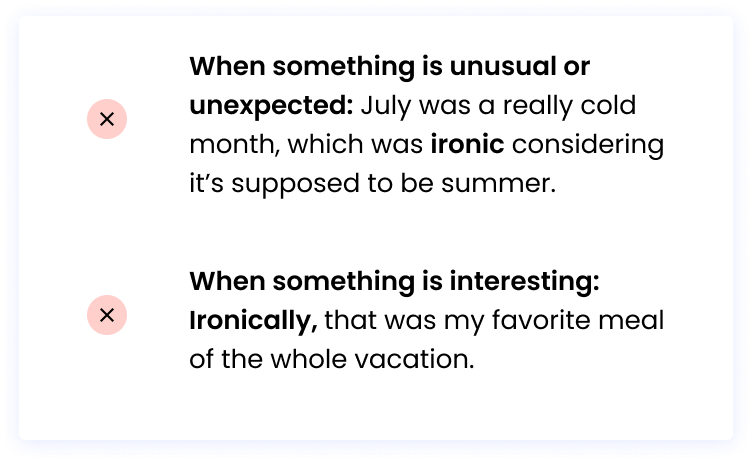
What about the song Ironic ?
Even singer Alanis Morissette got the definition wrong in her hit 1995 single “Ironic.” In fact, the criticism of her song was so strong, she had to clarify that she wasn’t technically trying to say that every line of the song was ironic.
Let’s take a closer look at Morissette’s timeless song lyrics:
It’s like rain on your wedding day,
It’s a free ride when you’ve already paid,
It’s the good advice that you just didn’t take.
While it could be considered bad luck, rain on a wedding day isn’t ironic , since it’s not as though it’s a given that every wedding day will have perfect sunny weather.
In a similar vein, a free ride when you’ve already paid or not taking good advice isn’t ironic either. The former is unusual and the latter is something that’s interesting.
Types of irony
To help you better understand irony and how to use it in your writing, we’ll dive into five different types.
Verbal irony
Verbal irony is when the intended meaning of a phrase is the opposite of what is meant. It’s a figure of speech used to emphasize the contrast in meanings. It’s often used as a way of injecting witty humor into someone’s speech or writing.
There are many English expressions that epitomize verbal irony. Here are a few:
• “Fat chance!”
• “Clear as mud”
• “As soft as concrete”
Verbal irony works best as a literary technique when the reader already knows the initial concepts. For instance, it’s common knowledge that concrete is hard, and mud is opaque.
As you might imagine, an ironic understatement creates contrast by undermining the impact of something, despite the subject itself being quite severe.
In J.D. Salinger’s novel, The Catcher in the Rye , the character Holden Caulfield says, “I have to have this operation. It isn’t very serious. I have this tiny little tumor on the brain.”
Of course, having a brain tumor is a serious health issue, which Holden downplays in this excerpt.
Alternatively, an ironic overstatement makes something insignificant sound like a bigger deal than it is to highlight how minor it is. Statements like these are figurative language and are the opposite of their literal meaning.
Say you go for a job interview, but it’s a trainwreck because you spill coffee on your brand-new suit, are 20 minutes late, and forget the interviewer’s name. Your partner asks you how it went and you say, “Aced it, best interview of my life” –– that’s an ironic overstatement.
If verbal irony sounds like it’s pretty familiar, it’s because sarcasm is actually a form of verbal irony (more on that later.)
Dramatic irony
A favorite in many famous movies and books, dramatic irony is a literary device where the reader or spectator knows critical information but the characters don’t.
One of the most famous examples of literary dramatic irony is in O. Henry’s short story, “The Gift of the Magi.” A recently married couple chooses independently to sacrifice and sell what means most to them to buy a Christmas gift for the other.
But in a twist of fate, the gifts they receive from each other are meant for the prized possessions they just sold. Although their sacrifices show the love they have for one another, the gifts they receive are actually useless.
Dramatic irony is a staple in horror movies. For example, the main character hides under the bed where the killer is hiding (the audience knows the killer is there but the protagonist doesn’t.) This form of irony is a great way of keeping the audience on the edge of their seats and building tension.
Tragic irony
In tragic irony, a subset of dramatic irony, the words, and actions of the characters contradict reality, often in a tragic or devastating way, which the readers or spectators realize.
Tragic irony came to define many ancient Greek tragedies. For instance, in Sophocles’ “Oedipus Rex,” the audience can see what Oedipus is blind to: he’s actually killing his own father.
William Shakespeare was also a fan of using tragic irony to keep the audience gripped to a compelling, often sorrowful plotline. In Romeo and Juliet , when Romeo is alerted of Juliet’s death, he assumes the tragic news to be true.
But the audience knows that Juliet has, in fact, just faked her death with the help of a potion. Romeo, on the other hand, thinks Juliet is dead and, as a result, commits suicide.
Socratic irony
Socratic irony gets its name from the moral philosopher Socrates, who would often fake ignorance to reveal someone’s misconstrued assumptions. It’s one of the more manipulative types of irony and is one way of getting information out of someone that can then be used against them later.
You might recognize socratic irony in courtroom scenes from legal dramas like Suits . Lawyers often use rhetorical tricks, like socratic irony , to get someone to confess or admit something.
Socratic irony is also perfect for comedies, too. In a classic scene from the American comedy T he Office , Michael knows that Dwight lied about going to the dentist. When Dwight returns, Michael goes for some rather ineffective rhetorical questioning to try and catch Dwight out.
Situational irony
Situational irony or the “irony of events” is when the reality contradicts an expected outcome.
In movies and literature, situational irony ensures things are unpredictable and interesting. After all, it’d be dull if the plot turned out exactly how we expected every time. It’s not how life or fictional storytelling works.
With situational irony, we learn at the same time as the characters that our expectations are different from reality.
For example in American Psycho , Patrick Bateman confesses to committing a string of murders but is laughed off. We anticipate that he’ll be punished for his crimes, but he isn’t, making it a perfect example of situational irony.
The Wonderful Wizard of Oz is another story full of examples of situational irony. Dorothy longs to go home and fulfills the wizard’s demanding list of tasks only to find out she had the ability to return home all along. The lion who appears to be a coward is actually courageous and the scarecrow who wants to be intelligent is actually a genius.
Situational irony is linked to the concept of cosmic irony –– when the universe or gods seemingly conspire for an event for its own amusement.
Cosmic irony is a subcategory of situational irony but is defined by the inclusion of a supernatural element. There’s still a situation where the reality and expectation are different but there is another element involved –– a higher power if you will. This could be god, the universe, or fate.
Remember that the “irony of events” isn’t the same as a coincidence or plain bad luck.
What’s the difference between irony and sarcasm?
Ah, “sarcasm the lowest form of wit” as the writer, Oscar Wilde, once said. While Wilde wasn’t a fan, a sarcastic jibe here and there isn’t always bad news.
People often mix up irony and sarcasm. As we touched on briefly above, sarcasm is actually a type of irony.
So the difference between sarcasm and irony is pretty small and nuanced. Once you’re clear on how sarcasm fits into irony, you won’t find yourself identifying sarcasm as irony again.
In its simplest form, irony refers to situations where the outcome is the opposite of what you or the reader expect.
If a prediction is black, then the outcome would be white. Not off-white or gray, it would have to be totally the opposite of black.
Sarcasm, on the other hand, is a form of expression that’s generally pointed at a person with the objective of criticizing or denigrating someone. Sarcasm is usually insincere speech and can have a condescending tone to it, with the purpose of insulting or embarrassing someone.
Let’s take a look at both verbal irony and sarcasm side by side:
Verbal irony — Wife saying, “What a beautiful stormy day for a swim.”
Sarcasm — Husband saying to the same wife, “The middle of the hurricane season was a great time for a vacation out here.”
See how with verbal irony, it’s ironic because the weather isn’t beautiful for swimming. Instead, the opposite is true –– it’s unpleasant and sometimes dangerous to swim during a storm.
But sarcasm is making a sneering comment about choosing to go on vacation in the middle of hurricane season. When you see the two statements together, it’s easier to see how they differ from one another.
Let’s look at some more sarcasm examples:
• After someone tells a boring or never-ending story: “That’s so fascinating.”
• After failing your driving test: “Well, that went well.”
• Self-deprecating: “ Dinner is burned, I’m such a great chef. ”
To easily differentiate between sarcasm and irony, remember that irony applies to situations while sarcasm is a form of expression. In a way, sarcasm is like irony dressed up with a sassy attitude.
Key takeaways: irony
So, that’s a wrap. Irony isn’t all that difficult to wrap your head around when you know what to look for. Ultimately, irony is just the use of words to express something that’s the opposite of the literal meaning.
When used correctly, irony helps you inject humor and wit into your writing while keeping things interesting and unexpected for the reader.
Looking to make your writing more engaging? Try a free trial with Writer today.
--> “A wide screen just makes a bad film twice as bad.” -->
May Habib CEO, Writer.com
Here’s what else you should know about Ascending.
More resources

– 9 min read
Boost your content team’s productivity with better meetings — lessons from Shift

Nadia Tatlow
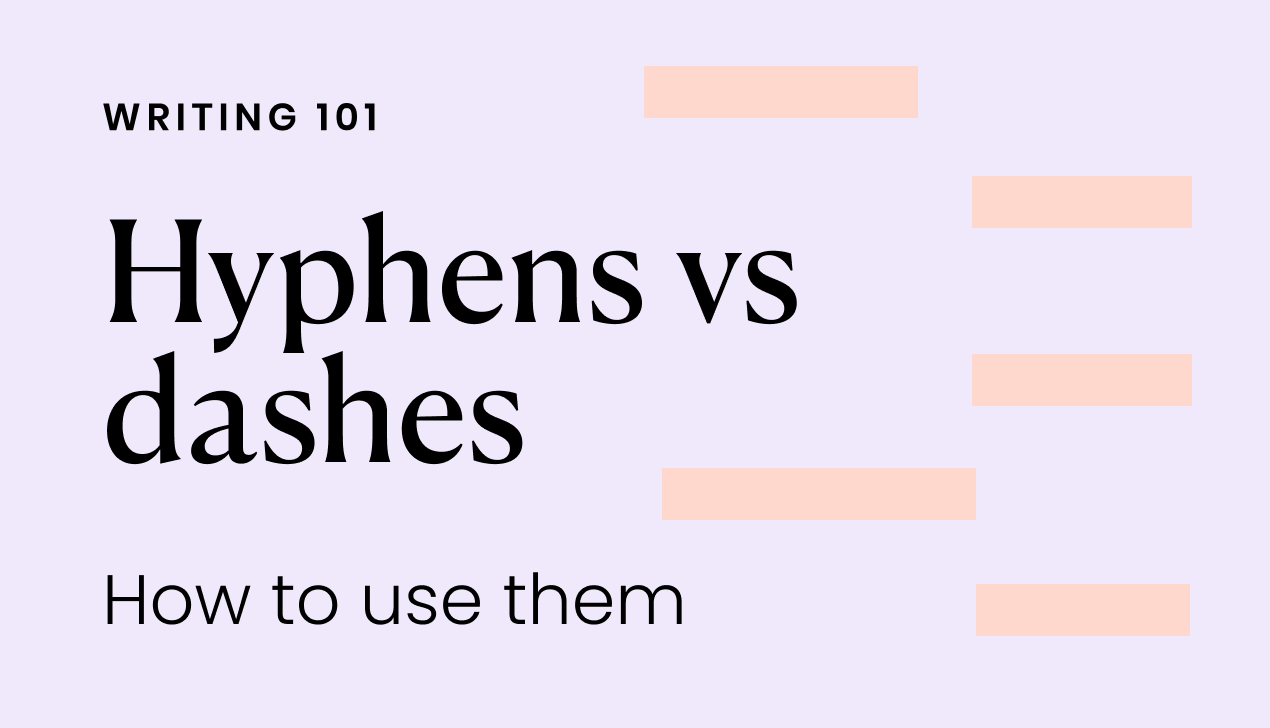
– 6 min read
Hyphens vs. dashes: know the difference

Jessica Malnik
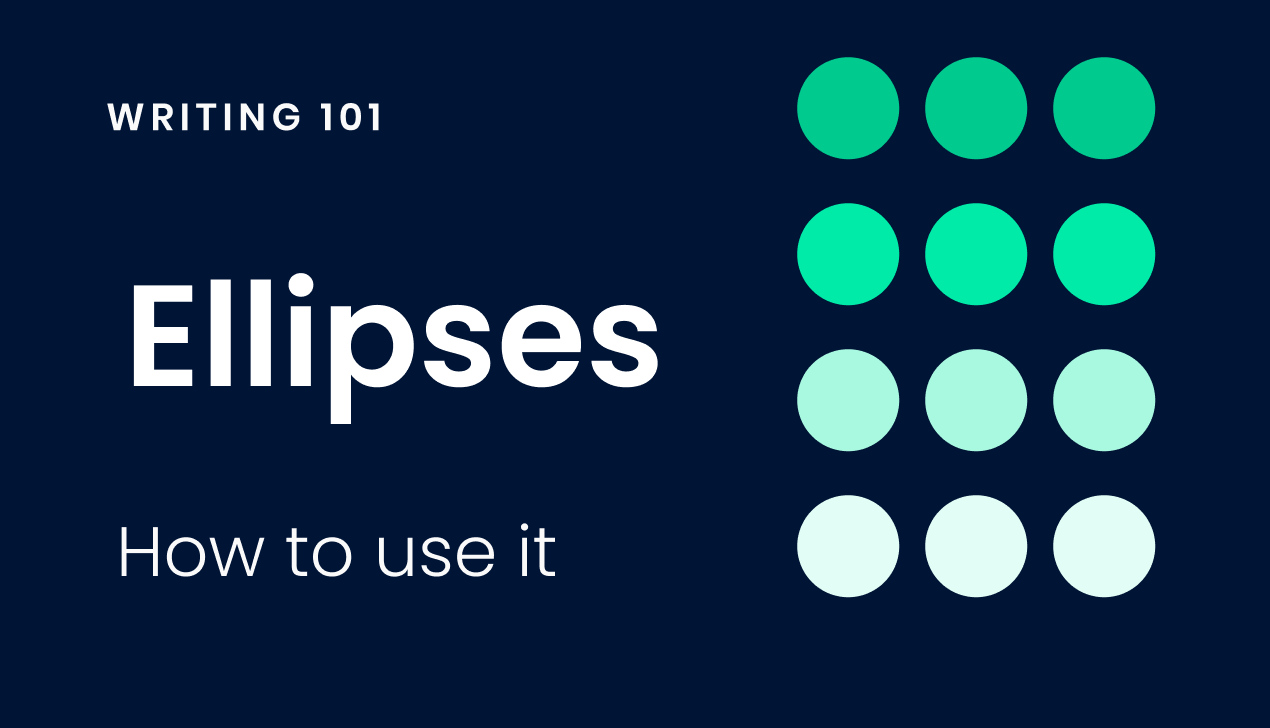
– 5 min read
How to use ellipses in your writing
- Words With Friends Cheat
- Word Finder
- Crossword Top Picks
- Anagram Solver
- Word Descrambler
- Word Unscrambler
- Scrabble Cheat
- Unscrambler
- Scrabble Word Finder
- Word Scramble
- Scrabble Go Word Finder
- Word Solver
- Jumble Solver
- Blossom Answer Finder
- Crossword Solver
- NYT Spelling Bee Answers
- Wordscapes Answers
- Word Cookies Answers
- Words Of Wonders
- 4 Pics 1 Word
- Word Generator
- Anagramme Expert
- Apalabrados Trucos
- Today's NYT Wordle Answer
- Today's NYT Connections Answers
- Today's Connections Hints
- Today's NYT Mini Crossword Answers
- Today's NYT Spelling Bee Answers
- Today's Contexto Answer
- Today's NYT Strands Answer
- Grammar Rules And Examples
- Misspellings
- Confusing Words
- Scrabble Dictionary
- Words With Friends Dictionary
- Words Ending In
- Words By Length
- Words With Letters
- Words Start With
- 5-letter Words With These Letters
- 5-letter Words Start With
- 5-letter Words Ending In
- All Consonant Words
- Vowel Words
- Words With Q Without U
- Username Generator
- Password Generator
- Random Word Generator
- Word Counter
- Crossword Puzzles
- Scramble Words
What Is Irony? Irony Examples and More
Suitable for grades 6+, more content, what is irony, verbal irony with examples, situational irony with examples, dramatic irony with examples, where does irony come from.
Irony is a figure of speech . Say It’s raining cats and dogs outside. You and your friend still have a long walk home, and you’re already soaked. You can see lightning in the distance and hear loud booms of thunder.
But your friend turns to you and says, “Isn’t it such a nice day out?”
That’s irony, and it's a figure of speech.
There are many different types of irony, but generally, it’s all about expectations. You expect one thing, but then something else happens .
Examples of Irony are everywhere: in conversations, books, movies, and even memes on the internet!

Different Types of Irony
There are many kinds of irony; some types of irony are used to dramatize, but most of the time, the definition of irony is to spin the literal meaning to make the statement humorous.
Verbal irony is when someone says something different than what they mean. Most people are familiar with sarcasm , but verbal irony also appears in other types of figures of speech. Here are the four most important types of verbal irony.
Examples of Verbal Irony
- You arrived 10 minutes late to the movies and missed the first scene. You turn to your friend and say, “This is the worst day of my life!”
This is an example of overstatement or hyperbole . In this form of verbal irony, your statement is more dramatic than the situation requires. Its literal meaning is much more dramatic than the situation needs, which emphasizes the point.
An understatement is the opposite of an overstatement. Rather than being “over the top,” you purposefully make the situation seem less important than it is .
- A bully has been tormenting you all year. But when a teacher asks you about it, you say, “We’re not the best of friends.”
Instead of “overreacting” as you would with overstatement, you’re downplaying the bullying with an understatement.
Sarcasm and irony are often used synonymously, but they’re not actually the same thing. While sarcastic people say something different than what they actually mean (verbal irony), they also intend to make fun of or mock someone else .
- You’ve been looking everywhere for your glasses. And after ten minutes of searching, you find that they’ve been on top of your head the whole time. Your friend says, “Great find, Sherlock.”
There’s cruelty or maliciousness to sarcasm that isn’t necessarily a part of other forms of verbal irony.
Socratic irony has to do with manipulation . In this form of irony, you pretend not to know something in order to get the other person to admit they are wrong .
For instance, you may get someone else to confess a secret or admit they were lying. But you do it by asking questions you already know the answers too.
It’s a trap!
- Well, gee! I have no idea who left the empty plate in the refrigerator.
Examples Of Verbal Irony And Sarcasm
Flip the flashcard for more examples.
What type of irony is I will die if he asks me to dance!
What type of irony is It only rained a little bit! (When it has stormed)
Understatement
What type of irony is I have no idea how the gifts go there! (You probably have an idea)
Situational irony also has to do with expectations, but you don’t need words. Instead, situational irony is when you expect one thing to occur, but something else happens .
It doesn’t have to be funny, mocking, or malicious. It just has to be different from your expectations.
- You have a stomachache, so you go to the doctor’s office. But the doctor isn’t there because she is at home in bed with the flu.
- You cut your finger while trying to open a box of adhesive bandages.
- You go on a hike but get lost and run out of food and water. After wandering for many hours trying to find your way home, you end up sleeping in the woods. But when you wake up, you look around and see your house right in front of you.
- You are an award-winning engineer, and you develop the most advanced, strongest material for building roads. Everyone is very excited because there won’t be any more potholes. But the first person to ride down the street on a bicycle accidentally cracks the pavement.
- The cheese maker is allergic to lactose.
Checkpoint ✔️ Drag the meaning to the corresponding type of irony.
Feigning ignorance to expose other people's ignorance.
Exaggerating statements to make them bigger and more dramatic.
Using irony to mock or show contempt humorously.
Presenting something as less important than it is.
The cause and effect of a situation that wasn't expected.
Situational
Dramatic irony is a type of irony found in works such as books, plays, or movies. In this type of irony, the audience knows more than the characters within the work. Therefore, you know what will happen before the characters do, which creates tension.
If you like horror movies, you’re probably used to dramatic irony. Often, directors use dramatic irony to increase suspense.
- You might know there’s a murderer in the closet, but the character unknowingly opens the door anyway.
- A character is on the top of a crumbling cliff and says, "it's so beautiful, I could die," before they fall off the cliff.
- In Romeo and Juliet, their families stop fighting each other because of the deaths of their youngest children.
- A couple goes to a masquerade ball and starts talking, but because they don't who they're speaking to, they tell the other person a secret.
- A person goes to the airport to apologize to their partner, but their partner has left the airport to go and apologize to them.
One benefit of adding dramatic irony to your writing is to get your readers more involved in the plot. They’ll think, “I want to tell the character what’s happening!” – just as you would if you knew there was a cliff that a movie character couldn’t see but was about to drive off.
Every country and language has forms of irony or at least examples of it. The actual meaning of a phrase is spun around and given a whole new definition of irony to feign ignorance, be sarcastic, or even dramatize a statement's ironic nature.
The term irony has many historical roots. Socratic irony, in particular, stems from the Greek comic character Eiron. This character uses his wit to triumph over the outlandish character Alazon. It is the inspiration for the Platonic dialogues, a series of ironic stories in literature developed by the Greek philosopher Plato in the 4th Century BC.
The three most common types of irony are verbal, dramatic, and situational.
Dramatic irony, in particular, depends on the structure of the work rather than words and is used in both theatre and poetical irony to draw the audience in. In contrast, situational irony is more about the outcome of a situation, where the result is different from what was expected. Some major types of situational irony in literature are in Shakespeare's Romeo and Juliet , where Romeo kills himself after learning of his lover's death despite her being alive. There are also many examples of situational irony in everyday life, which inspired the 1996 hit song by Alanis Morissette, Ironic .
Regardless of whether you've encountered it before, forms of irony are a great figure of speech to use in your writing.
Irony comes in many forms, and you can find it in both casual conversations, great works of literature, and poetic irony – plus everywhere in between!
As you read books, watch movies, see plays, or simply talk to your friends, try to identify verbal, situational, and dramatic irony. Irony is a fantastic way to enrich language and storytelling.
Also, check out the other pages on this site! There’s lots of great information about other literary terms and grammar topics.
- Idiom Worksheets
- Onomatopoeia Worksheets
- Reading Comprehension Worksheets
More Literary Device Topics:
- Literary Devices - Types and Examples
- Point of View Examples
Figurative Language Topics:
- Figurative Language
- Metaphor Examples
- Personification
- Alliteration
- Onomatopoeia
- Popular Pages
- Top Searches
- External Resources
- Definitions
- WordFinderX
- Letter Solver

AI Generator
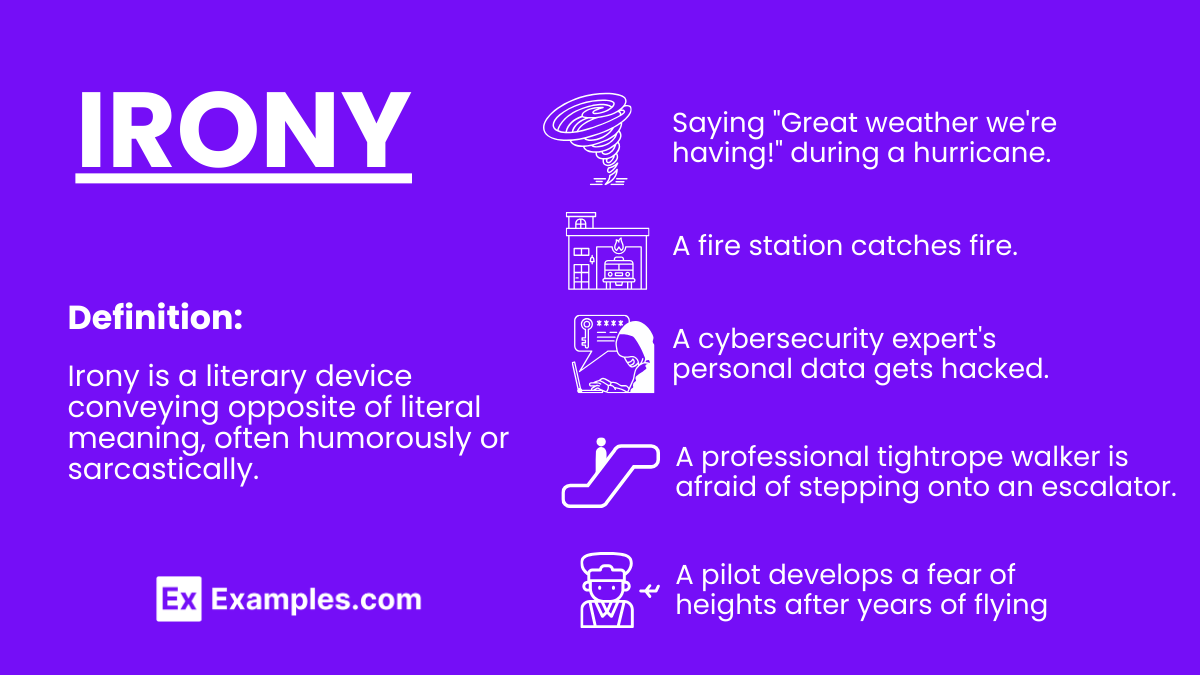
Enter the fascinating realm of irony, a literary device that enriches sentences with layers of meaning, often laced with wit or an unexpected twist. Through irony, writers captivate readers, urging them to look beyond the surface. Discover a variety of irony sentence examples and gain valuable tips for crafting sentences that resonate with hidden insights and surprising undertones.
What Is Irony? Irony is defined as putting something that was intended to have a better result only to be given a different one, often a negative kind of result. A type of figurative language used in literary writing and conversations. To put a different meaning to what is being thought.
Example of Irony
A man who is a passionate advocate for living a healthy lifestyle and regularly lectures others about the dangers of smoking is discovered to be a heavy smoker himself.
This situation is an example of situational irony because there is a stark contrast between the expectations set by the man’s public advocacy against smoking and his personal behavior. Situational irony arises when there is a discrepancy between what is expected to happen and what actually occurs. In this case, the expectation is that someone who vocally opposes smoking and promotes health would not smoke. The irony lies in the revelation that his actions contradict his words, highlighting the unexpected and often hypocritical nature of human behavior. This kind of irony can provoke thought, elicit humor, or critique societal norms and personal inconsistencies.
Origin of Irony
Irony is a literary device with deep historical roots. The term “irony” comes from the Greek word “eironeia,” meaning “dissimulation” or “feigned ignorance.” It was prominently used by ancient Greek playwrights, especially Aristophanes and Sophocles, who employed irony to convey complex themes and critique societal norms in an engaging and thought-provoking manner. The concept evolved further during the Renaissance, as scholars and writers explored new ways of expressing the human condition. Figures like Shakespeare masterfully used irony to add depth to their characters and plots, revealing the discrepancies between appearance and reality.
In modern literature, irony remains a powerful tool. It allows writers to convey deeper meanings, create contrasts, and elicit a range of emotional responses from their audience. By using irony, authors can subtly highlight the contradictions and complexities of life, making their work more relatable and engaging. This literary device continues to be an essential element in storytelling, enhancing the richness and depth of narrative expression.
Irony Examples
- A traffic jam on the way to a conference promoting better public transportation: This situation is ironic because the problem the conference aims to solve is directly impacting its attendees.
- A plumber’s house has leaky pipes: It’s ironic that a professional skilled in fixing pipes has plumbing issues at home, highlighting a discrepancy between professional expertise and personal circumstances.
- “The Gift of the Magi” by O. Henry: This short story is a classic example of situational irony. A husband and wife each sell their most prized possession to buy a gift for the other, only to find the gifts are now useless because they complement the items that were sold.
- The Unsinkable Titanic: Often cited as an example of situational irony, the Titanic was touted as unsinkable but sank on its maiden voyage after hitting an iceberg, resulting in a tragic loss of life.
- A pilot who is afraid of heights: The irony lies in the juxtaposition of a professional who spends a lot of time in the air but is afraid of being high above the ground.
- An English teacher struggles with spelling: This scenario is ironic because it contradicts the expectation that an expert in language would excel in all its aspects, including spelling.
- “Oedipus Rex” by Sophocles: Dramatic irony is at its peak when Oedipus, determined to find the murderer of the former king to save Thebes from a plague, discovers that he himself is the murderer, fulfilling the prophecy he tried to avoid.
- A fire station burns down: This is an example of situational irony where the institution equipped to prevent fires is itself destroyed by one.
- A marriage counselor files for divorce: The irony here stems from the expectation that a professional who advises on strong relationships faces personal relationship failure.
- Posting about the importance of a digital detox on social media: The irony lies in using a digital platform to advocate for spending time away from digital devices and platforms.
What is the Irony Sentence? – Definition
An irony sentence is a statement that, through its context or delivery, conveys a meaning opposite to its literal interpretation. It’s a rhetorical device often used to express sarcasm, humor, or critique, where the actual intention is understood to be different from the words used. Irony can highlight contrasts between expectations and reality, offering insightful or humorous observations about life, situations, or characters. For example, saying “What a beautiful view!” when looking out at a brick wall directly opposite your window relies on the listener’s understanding that the expected beautiful view is starkly absent, making the statement ironic.
What is the best Example of an Irony Sentence?
Consider the statement: “The most well-equipped fire station in town burned down while firefighters were responding to a call across the city.” In this sentence, the irony lies in the fact that while the fire station had all the tools to combat fires, it ironically burned down itself. The expectation is that a well-equipped fire station would be the last place to face such a situation, making the outcome unexpected and ironic.
100 Irony Sentence Examples
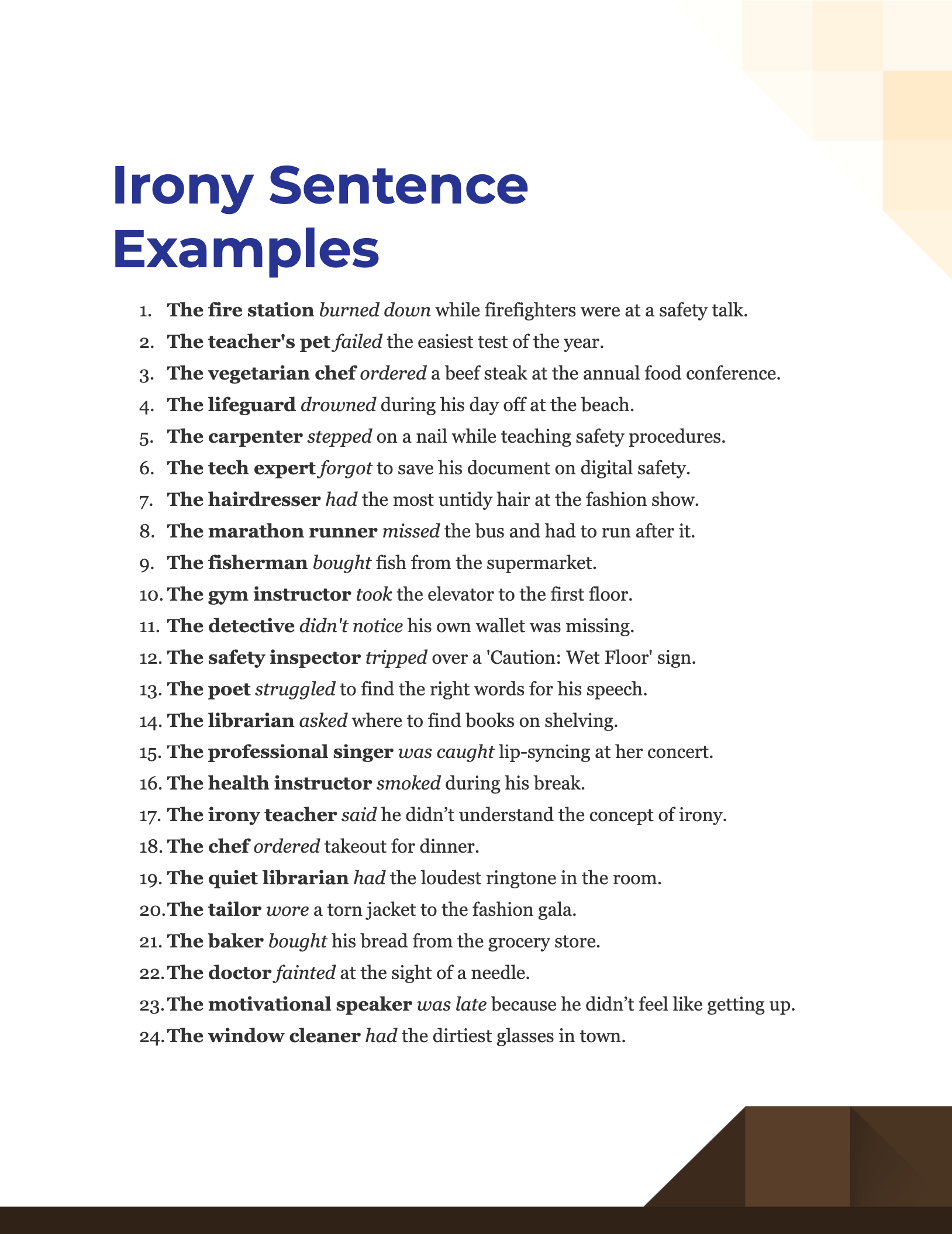
Dive into the world of irony, where words dance with dual meanings, and sentences cleverly veil their true intentions. The charm of irony lies in its ability to surprise the reader with a twist, a play on expectations, presenting reality in a light that’s both humorous and thought-provoking. Explore a curated collection of irony-laden sentences, each showcasing the versatility and depth of this compelling literary device.
- The fire station burned down while firefighters were at a safety talk.
- The teacher’s pet failed the easiest test of the year.
- The vegetarian chef ordered a beef steak at the annual food conference.
- The lifeguard drowned during his day off at the beach.
- The carpenter stepped on a nail while teaching safety procedures.
- The tech expert forgot to save his document on digital safety.
- The hairdresser had the most untidy hair at the fashion show.
- The marathon runner missed the bus and had to run after it.
- The fisherman bought fish from the supermarket.
- The gym instructor took the elevator to the first floor.
- The detective didn’t notice his own wallet was missing.
- The safety inspector tripped over a ‘Caution: Wet Floor’ sign.
- The poet struggled to find the right words for his speech.
- The librarian asked where to find books on shelving.
- The professional singer was caught lip-syncing at her concert.
- The health instructor smoked during his break.
- The irony teacher said he didn’t understand the concept of irony.
- The chef ordered takeout for dinner.
- The quiet librarian had the loudest ringtone in the room.
- The tailor wore a torn jacket to the fashion gala.
- The baker bought his bread from the grocery store.
- The doctor fainted at the sight of a needle.
- The motivational speaker was late because he didn’t feel like getting up.
- The window cleaner had the dirtiest glasses in town.
- The English teacher wrote the sentence with a glaring grammar mistake.
- The historian forgot the date of a major historical event.
- The clockmaker was always late for appointments.
- The dance instructor tripped on the dance floor.
- The animal rights activist swatted the mosquito.
- The environmentalist threw his trash on the road.
- The editor missed a typo in the word ‘mistake’.
- The technology critic queued for hours for the latest phone.
- The dentist had the most cavities at the dental convention.
- The fitness trainer took a cab for a two-minute walk.
- The painter couldn’t find the right color in a rainbow.
- The weather reporter forgot his umbrella on a rainy forecast day.
- The sleep expert yawned during his seminar.
- The bakery owner was on a strict no-carb diet.
- The vet had allergies to cats.
- The peace ambassador started an argument in the meeting.
- The psychologist said he didn’t believe in therapy.
- The music teacher missed a note during her recital.
- The gardener had the wilting plants on the block.
- The electrician got shocked plugging in his phone charger.
- The financial advisor filed for bankruptcy.
- The plumber had the leakiest faucets at home.
- The nutritionist binged on candy bars.
- The water safety instructor refused to dip his toes in the pool.
- The sunscreen brand ambassador got the worst sunburn.
- The art critic couldn’t draw a straight line.
- The professional chef burned his toast in the morning.
- The yoga instructor couldn’t touch her toes.
- The locksmith got locked out of his house.
- The phone technician forgot his phone password.
- The professional organizer lost her keys in her cluttered bag.
- The optician squinted while reading the menu.
- The travel guide got lost on the tour.
- The math tutor used a calculator for basic arithmetic.
- The tech guru asked for help turning on his computer.
- The film critic made the worst movie of the year.
- The sound engineer asked someone to repeat their statement.
- The wine connoisseur spilled red wine on his white shirt.
- The cleanliness freak had the messiest desk in the office.
- The communication expert sent an unclear message.
- The marriage counselor got divorced .
- The writing coach misspelled ‘grammar’ in her presentation.
- The pilot had a fear of heights.
- The computer scientist had a paper calendar.
- The philosopher said he knew nothing about life.
- The fashion designer wore the same outfit every day.
- The software developer used a decade-old software version.
- The hairstylist had a bad hair day.
- The beautician never wore makeup.
- The award-winning actor forgot his lines on stage.
- The fitness guru ate a whole chocolate cake.
- The crime novelist lost a mystery book.
- The hygiene expert had stained clothes.
- The architect lived in a lopsided house.
- The translator couldn’t speak his native language fluently.
- The professional cleaner left a spot while cleaning.
- The coffee shop owner preferred tea every morning.
- The bird expert was scared of pigeons in the park.
- The famous chef loved instant noodles for dinner.
- The professional photographer had blurry family photos.
- The renowned astronomer wished upon a shooting star.
- The singing coach lip-synced at karaoke night.
- The humorist didn’t understand the joke at the party.
- The leading botanist couldn’t keep his houseplants alive.
- The etiquette coach chewed with her mouth open.
- The financial guru paid extra for expedited shipping on a self-help book about saving money.
- The wildlife expert was scared to pet the kitten.
- The mystery author couldn’t find his glasses on his head.
- The professional swimmer used floaties in the shallow pool.
- The music mogul whistled off-key .
- The meditation instructor was the most anxious in the room.
- The ice-cream shop owner was lactose intolerant .
- The famed historian forgot his wedding anniversary.
- The professional runner was outpaced by a toddler.
- The tech expert panicked when his TV remote wouldn’t work.
- The literature professor judged books by their covers .
Irony brings an element of surprise to the narrative, often challenging our perceptions and providing commentary on the unpredictability of life. Each of these examples reflects the multifaceted nature of irony, showcasing how it can be employed to craft statements that are both thought-provoking and delightfully unexpected.
Types of Irony
1. verbal irony.
Verbal irony occurs when a speaker says one thing but means another, often the opposite of what is said. It is closely related to sarcasm, though not all instances of verbal irony are sarcastic. For example, saying “What a wonderful day” during a severe storm.
2. Situational Irony
This type of irony arises from a discrepancy between what is expected to happen and what actually occurs. Situational irony often involves circumstances that are the opposite of what the characters and audience anticipate. A classic example is a fire station catching fire, given that its primary purpose is to extinguish fires.
3. Dramatic Irony
Dramatic irony occurs in narratives when the audience knows more about a situation, the significance of actions, or the outcome of events than the characters within the story. This can create suspense or humor. A well-known example is in Shakespeare’s “Romeo and Juliet,” where the audience knows Juliet is not dead, but Romeo does not, leading to tragic consequences.
4. Cosmic Irony (Irony of Fate)
Cosmic irony or irony of fate refers to the idea that the gods, fate, or the universe conspire to frustrate human efforts, leading to outcomes contrary to what was expected or desired. This type of irony suggests that no matter how hard people try, their efforts can be rendered useless by forces beyond their control. An example is the story of King Midas, who wishes everything he touches to turn to gold, only to find this gift becomes a curse.
5. Historical Irony
Historical irony occurs when real-life events unfold in ways that seem to mock human intentions and expectations. For instance, the unsinkable Titanic sinking on its maiden voyage is an example of historical irony, highlighting the hubris involved in declaring it unsinkable.
6. Socratic Irony
Socratic irony is a technique used by Socrates in which he pretended ignorance of a subject to draw out the flawed arguments or knowledge of others. By acting as if he knows less than his interlocutors, Socrates would lead them to expose their own lack of understanding.
What makes a sentence ironic?
Irony is a multifaceted literary tool that captivates audiences by subverting expectations. But what gives a sentence that ironic twist, making it both intriguing and layered? Let’s dissect the anatomy of irony in sentences:
- Contradictory Outcomes : The essence of irony often lies in the difference between what is expected to happen and what actually occurs. For example, if a professional pickpocket has his own wallet stolen, the situation becomes ironic.
- Hidden Meanings : Irony thrives on dual interpretations. The surface meaning of an ironic statement might be straightforward, but there’s an underlying layer that provides the actual, often contradictory, message.
- Context is Key : For a sentence to be ironic, it often needs the right context. A statement in isolation might not be ironic, but when juxtaposed against a specific backdrop, its ironic nature shines.
- Subtle Humor : Irony often carries a humorous undertone. It’s a gentle poke, a playful nudge, making the reader or listener rethink their initial understanding of the statement.
- Clashing Elements : An ironic sentence might pit opposing ideas against one another. For instance, “The unsinkable ship sank on its maiden voyage” – here, the notion of the ship being ‘unsinkable’ clashes with its sinking, producing irony.
- Voice and Tone : Sometimes, it’s not just the words but the way they’re delivered that evokes irony. A sarcastic tone or a particular emphasis can make an otherwise normal sentence ironic.
How to Use Irony
There are a lot of different aspects to using irony. From conversations, literary writing, and even in essays or speeches to attract the attention of your readers and listeners. The use of irony in different ways should be something worth understanding and studying.
Step 1: Using Irony in Example Sentences
Write it in a clear way so that the audience can detect the irony in the sentence. You should be careful with how you write the irony and what type of irony you are making so as to not confuse your audience.
Step 2: Essay and Speeches May Require a Little Irony
Using irony in speeches and essay writing draws attention to your audience and your readers. Especially when the irony was intentional, or when it is used for comedic relief on a very serious matter. There are times and places to use this so choose the right moment.
Step 3: Teaching Kids the Use of Irony in Class
Teachers can use irony in the form of conversations, example sentences, and real-life situations. They teach the students to use irony in certain situations and to let them find the irony written in literary stories. There are a lot of other ways to teach irony in class.
Step 4: Using Irony in Literary Stories or Literary Pieces
Letting your readers find out about the life of the character before the character themselves. It is not only a fun experience for your readers, but it also gives them an opportunity to know the difference. It also helps them enhance how to tell the difference.
Functions of Irony
Creates Contrast :
- Highlights the difference between appearance and reality.
- Reveals discrepancies between what is said and what is meant or what is expected to happen and what actually occurs.
Enhances Emotional Engagement :
- Evokes a range of emotions, from humor and amusement to pity and sorrow.
- Makes the narrative more compelling and memorable.
Provides Social Commentary :
- Critiques individuals, institutions, or societal norms indirectly.
- Encourages readers to question and reflect on underlying issues.
Enriches Character Development :
- Reveals hidden aspects of a character’s personality or motivations.
- Creates more complex and multi-dimensional characters.
Adds Depth and Meaning :
- Adds layers of meaning to the text, making it richer and more nuanced.
- Enhances the overall depth and realism of the story.
What are real irony examples?
- Historical Irony : The Titanic, deemed “unsinkable,” tragically sank on its maiden voyage.
- Situational Irony : A fire station catching fire or a lifeguard drowning are both examples of outcomes that are the opposite of what one would expect.
- Verbal Irony : Saying “Oh, great!” when something undesirable happens. The words express positivity, but the intended meaning is negative.
- Dramatic Irony : In Shakespeare’s Romeo and Juliet , the audience knows that Juliet isn’t really dead, but Romeo doesn’t, leading him to make tragic decisions.
- Cosmic Irony : When the universe seems to play cruel tricks on individuals. For instance, a rainstorm occurring just after someone finishes washing their car.
- Irony in Modern Culture : Alanis Morissette’s song “Ironic” lists a series of unfortunate events, many of which are more coincidental than ironic, making the song itself ironically titled.
- Daily Life Irony : The queue for the “Fast Track” ticketing at amusement parks being the longest.
Irony, in its varied forms, offers writers and speakers a powerful tool to engage, humor, and challenge their audience. By understanding its nuances and recognizing its presence in everyday life, we can appreciate the layers and depths it adds to narratives and conversations.
How do you write an Irony Sentence? – Step by Step Guide
Crafting an effective ironic sentence requires a blend of wit, understanding of context, and a feel for the unexpected. Here’s a systematic approach to create irony-laden sentences:
- Identify Your Purpose : Before delving into irony, be clear about why you’re using it. Is it to humor your audience? Highlight a contradiction? Critique a situation?
- Choose a Familiar Context : Start with a scenario that’s familiar to most. This makes the irony more pronounced when expectations are subverted.
- Subvert Expectations : The heart of irony is the unexpected twist. Think about the usual outcome in your chosen context, then flip it on its head.
- Ensure Clarity : An ironic sentence loses its charm if it’s too ambiguous. The audience should recognize the intended irony rather than just seeing the sentence as misleading or unclear.
- Craft with Wit : While not all ironic sentences are humorous, a touch of wit can make them more memorable.
- Refrain from Over-explaining : Let the irony speak for itself. If you have to explain why something is ironic, it often loses its impact.
- Test on an Audience : Sometimes, what seems ironic to one person might not to another. Share your sentence with others to gauge its effectiveness.
Tips for Using Irony Sentences
- Use Sparingly : Irony is like a spice – best used judiciously. Too much can overpower the narrative and confuse the reader.
- Match the Tone : Ensure your ironic sentences match the tone of your content. In a serious piece, a lightly sarcastic ironic remark might feel out of place.
- Be Culturally Aware : Irony, especially verbal irony, can be culture-specific. What’s seen as ironic in one culture might not be in another.
- Avoid Sarcasm : While sarcasm is a form of irony, it can be more biting and potentially hurtful. Ensure your ironic sentences don’t veer into sarcasm unless that’s the intent.
- Use in Descriptive Passages : Irony can be effectively employed in descriptions to provide fresh perspectives or highlight contrasts.
- Perfect Timing : The impact of irony often lies in its timing. In a narrative or conversation, placing an ironic sentence at the right moment can heighten its effect.
- Stay Updated : The perception of irony can evolve over time, with societal changes. Stay updated with contemporary usage to ensure your ironic sentences resonate with current audiences.
By understanding the intricacies of irony and mastering its application, writers and speakers can weave in a layer of depth and dimension into their narratives, making them more engaging and thought-provoking.
What is the difference between irony and sarcasm?
The main difference between irony and sarcasm is that the former pertains to figurative language or figure of speech while the latter is used in a sentence or in a conversation and is used as a means to throw insults at someone.
What are the different types of irony?
The different types of irony are sarcasm, dramatic irony, situational irony, comedic irony, poetic justice, Socratic irony, and verbal irony. Dramatic irony and verbal irony may be seen as one but these two types of irony are different from one another. Each of these types of Irony can be used in different ways and in different situations. You may encounter the majority of them in literature, but can also be seen in conversations.
What is the most common type of irony?
The most common type of irony is verbal irony , where a speaker says one thing but means another, often the opposite, creating a contrast between the literal and intended meaning.
When is it considered too much irony in essays or stories?
The only time when it is considered too much use of figurative language is when the entire message of your essay or story is not what should be expected. That outcome is not something a lot of people may have wanted, because using too much irony in your essay can also ruin the tone of your writing and ruin the meaning behind your essay or stories as well.
We come across different figurative languages when we write, read, converse, or all of the above. We know there are a lot of kinds, and one of the most common ones include irony. How you use irony in your writing will also matter as the sentences and the written irony will change the view of your writing or the message behind your writing. There are also other kinds of figurative language you can check on including simile , metaphor , personification , hyperbole , oxymoron , etc.
List of Other Literary Devices & Figurative Languages
| Alliteration | Antithesis | Assonance | Allegory |
| Allusion | Archetype | Fallacy | Anaphora |
| Analogy | Antecedent | Hyperbole | Antagonist |
| Anecdote | Cliche | Colloquialism | Context |
| Content Validity | Deus ex Machina | Diction | Dissonance |
| Double Entendre | Double Negative | Epigram | Epilogue |
| Epistrophe | Epithet | Euphemism | Exposition |
| Flashback | Foil Character | Gaslighting | Gerund |
| Haiku | Hamartia | Imagery | Jargon |
| Juxtaposition | Limerick | Litotes | Metaphor |
| Motif | Non sequiturs | Onomatopoeia | Oxymoron |
| Pacing | Paradox | Parallelism | Pathos |
| Peripeteia | Persona | Personification | Plot |
| Propaganda | Protagonist | Pun | Repetition |
| Rhetorical Context | Sarcasm | Satire | Setting |
| Simile | Soliloquy | Story Beat | Subplot |
| Subtext | Symbolism | Synecdoche | Theme |
| Tone | Rizz |
Text prompt
- Instructive
- Professional
10 Examples of Public speaking
20 Examples of Gas lighting

Press ESC to close

Irony Figure of Speech: Let’s Learn about a Significant Aspect of English Grammar

Ironical phrases are said and heard by everyone but do you know what an ironic figure of speech is? Well, these are the sentences that have a fair bit of contradiction between what is said and what it means. These words are used both professionally and personally to create fun, creativity, or different expressions.
Let’s learn about its types along with the examples so that next time you can use them before others or before those who use them to you. It should be grabbed by you perfectly to be magnificent. So, move ahead to the body of the article to find everything about the irony figure of speech.
Also Read: 10 Pronunciations You Should Avoid
What is an Ironic Figure of Speech?
If you want to know about the meaning of Irony, here it is. It is a figure of speech. The irony is one of the most widely- known literary devices, which is used to express a strong emotion or raise a point.
Talking about it more, irony refers to the use of words to convey a meaning that is opposite of what is said. It is used in the sentence to convey something else with some other words. It shows the game and magic of words.
You must reply to a person after understanding what he/she is trying to convey. If you don’t know about irony, it’s likely that you don’t understand the sentence and will not give a perfect response.
So, learn this figure of speech to be wonderful and greater understanding.
Irony Meaning
The irony is a contradiction between words and expressions. It confuses the other person about what you said and what you meant. The irony figure of speech is characterized by contrast and incongruity between reality and appearance. You will think about the words and their actual meaning. Have a look at this example.
For example, if a traffic officer has confiscated a man’s license. Then the man can say, “Thank you, Officer, now that you have my license I can’t drive”.
In the above sentence, the man was heavily angry and irritated by the act of the traffic officer because he had confiscated the man’s license but instead of expressing his anger fairly, he used irony to thank him for the same.
Also Read: 7 Frequently Used English Phrases
Types of Irony
Three types of irony figures of speech are known. This article will give you the meaning of these irony types along with the examples. So, let’s start.
#1. Verbal Irony
The verbal irony is a contrast between what is said and what is meant. It shows the contradiction between words and expressions.
For example:
#. After looking at a student’s poor test score, the teacher says, “You will surely finish the year with the highest honours”. #. A man tastes his wife’s delicious home-cooked meal and exclaims, “I shall never eat this food ever again”. #. After they kissed, the groom, with a smile on his face, muttered to his bride, “This is the day I will always want to forget”.
#2. Situational Irony
Situational irony occurs when the audience or the reader knows more than the character about every event. Talking differently, it refers to what the character thinks is true is incongruous with what the audience knows. Let’s get it perfectly with the help of examples.
Have a look at the irony examples:
#. Dr. Johnson smokes a pack of cigarettes a day. #. Our boss, the owner of a big construction firm, cannot fix his house’s broken ceiling. #. The defence lawyer failed to acquit his son in a case.
Also Read: Why English Fluency is Important in Workspace?
#3. Dramatic Irony
Dramatic irony is the contrast between the actual result of a situation and what was intended or expected to happen. It shows the difference or contradiction between expectations and the outcome.
Here are some irony examples:
#. In “Saving Private Ryan”, the group of soldiers was hopeless they could find Private James Ryan alive, but the audience knew from the start that Private Ryan went on to live until his later years. #. The wife believed that her husband died in an airplane crash, but the audience was aware that the husband had survived. #. Readers knew that Caitlyn’s character in the novel “A Song for Caitlin” would eventually die but the other characters never even knew she was sick.
Also Read: 5 Tricks to Convey Your Message Smartly
Hopefully, this article has provided you with the best learning to develop your English grammar. The irony is most commonly used by English speakers to be diplomatic and professional.
If you want to know more grammar tips, content, and strategies, you should visit the Fluent Life website. The professionals will teach and guide you to be excellent at writing, reading, and speaking English and be quintessentially amazing.
The application is also available by the same name that will help you to gain every possible potential knowledge about the language and its grammar. You must learn about everything to be fluent and worthy.
Leave a Reply Cancel reply
Save my name, email, and website in this browser for the next time I comment.
Share Article:
You might also like

Which English Speaking Course is Best?: Your Ultimate Guide

Is Fluent English Better than Intermediate?: Fluent vs Intermediate

Which English Certificate Course is Best?: A Comprehensive Guide
Other stories, what are modal auxiliary verbs let’s learn the condiments of english and their functions, anaphora figure of speech: know how to use it in english.
Advertisement
How Verbal Irony Works: Examples and Practical Uses
- Share Content on Facebook
- Share Content on LinkedIn
- Share Content on Flipboard
- Share Content on Reddit
- Share Content via Email
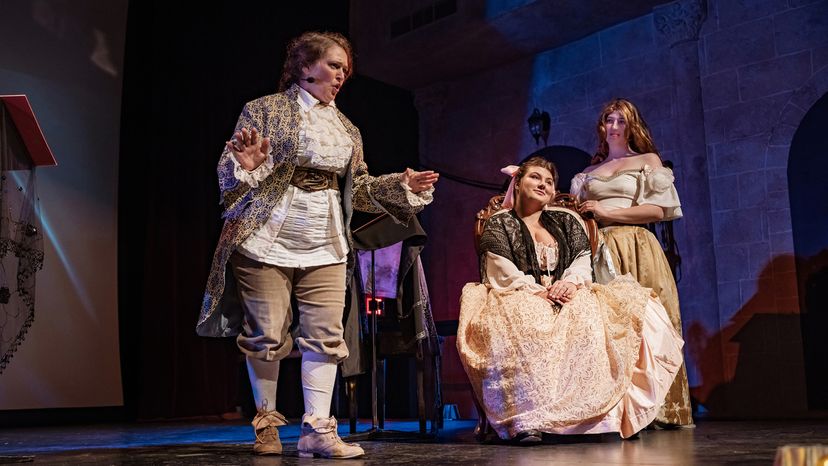
Verbal irony is a clever twist of language that keeps conversations interesting and adds humor by contrasting what is said with what is meant.
Whether it's Michael Scott from "The Office" declaring, "I am a master of leaving people wanting more," or a coworker saying, "Oh great, another meeting!" when they're clearly not excited, verbal irony spices up literature, pop culture and beyond.
Let's look at how you can master this engaging form of speech and transform your interactions.
What Is Verbal Irony?
Origins in ancient greece, rome and shakespeare, 7 verbal irony examples, 7 practical uses of verbal irony, other forms of irony, the true irony of alanis morissette's 'ironic'.
Verbal irony is a statement that, on its face, is the opposite of what the speaker truly means. This figure of speech is often used to express sarcasm and humor or emphasize a point by saying the opposite of what is true.
For example, if it's pouring rain outside and someone says, "What lovely weather we're having," that's verbal irony. The speaker doesn't actually think the weather is nice; they're using irony to highlight how unpleasant it is.
This type of irony relies on context and tone to convey the true meaning — but it's not the same as lying. The intention is for the audience to recognize the disparity between the words and the actual situation, not to take the literal meaning at face value.
This rhetorical device is common in literature, everyday conversation and various forms of media. It adds layers of meaning and engages the audience through wit and subtlety.
It can be employed as ironic similes , which compare two contrasting things in a way that highlights the irony. For instance, saying "as clear as mud" to describe something very confusing is an ironic simile that emphasizes the lack of clarity.
Verbal irony, like many rhetorical devices, has its roots in ancient literature and rhetoric. The concept can be traced back to ancient Greek and Roman cultures, where it was used extensively in both written and spoken forms of communication.
One of the earliest known references to irony is found in the works of the ancient Greek philosopher Socrates , who employed a method known as "Socratic irony." This technique involved Socrates pretending to be ignorant or feigning ignorance about a topic to provoke discussion and draw out the underlying assumptions and contradictions in his interlocutor's arguments.
This form of irony was more situational and dramatic but laid the groundwork for understanding irony as a rhetorical device.
Irony was also prevalent in ancient Greek comedy, where playwrights like Aristophanes used it to poke fun at societal norms, politicians and everyday life, providing entertainment while offering social commentary.
The formal study and definition of verbal irony came with the development of classical rhetoric. In his work " Institutio Oratoria ," the Roman rhetorician Quintilian provided one of the earliest comprehensive accounts of rhetorical devices, including irony. He described irony as a figure of speech where the speaker's intended meaning is opposite to the words they use.
Throughout history, verbal irony has been employed by many notable writers and playwrights, such as Shakespeare , who used it extensively in his plays to add humor, highlight contrasts and develop characters. For example, in "Julius Caesar," Mark Antony repeatedly calls Brutus an "honorable man" while implying the opposite.
Examples of verbal irony are everywhere, and you have likely used a few of these yourself over the years.
- Sarcasm : Sarcasm is a form of verbal irony. For example, if someone is having a particularly bad day and a friend says, "Well, aren't you having a great time?" The friend's statement is verbally ironic because it means the opposite of what they are saying.
- Literature : In Jane Austen's "Pride and Prejudice," Mr. Bennet sarcastically remarks, "I have a high respect for your nerves. They are my old friends. I have heard you mention them with consideration these last 20 years at least." This is verbally ironic because Mr. Bennet is actually mocking Mrs. Bennet's constant complaints about her nerves.
- Everyday conversation : If it is raining heavily outside and someone says, "What a beautiful day for a picnic," this is verbal irony because the actual weather is the opposite of beautiful for outdoor activities.
- Praise as criticism : A student who performs poorly on a test might say, "Wow, I really aced that one," meaning they did quite the opposite.
- Understatement : After finishing a marathon, a runner might say, "I’m a bit tired," when they are exhausted. The understatement here is verbally ironic because it downplays the true intensity of their fatigue.
- Exaggeration : A person stuck in traffic for hours might say, "This is exactly how I wanted to spend my day," meaning it is the complete opposite of what they wanted.
- Historical speeches : Winston Churchill, known for using irony, once said, "You were given the choice between war and dishonor. You chose dishonor, and you will have war." Here, the ironic twist highlights the false belief that dishonor would prevent war.
Verbal irony can be a powerful rhetorical tool when used effectively. Here are some ways it can be employed.
- Humor and wit : Verbal irony can add a layer of humor and wit to a conversation or piece of writing. For instance, in Oscar Wilde's "The Importance of Being Earnest," the line "The truth is rarely pure and never simple" is humorous and ironic, as it highlights the complexities of truth.
- Emphasizing a point : A speaker can forcefully emphasize the true point by stating the opposite of what one means. For example, a parent might say, "Oh sure, play video games instead of doing your homework. That's a brilliant idea," to stress the importance of completing homework first.
- Criticism without direct accusation : Verbal irony allows for less aggressive criticism. A statement like, "Oh, you're just the hardest worker, aren't you?" is directed at a lazy colleague and criticizes without direct accusation (but can also be seen as passive aggressive).
- Engaging an audience : Verbal irony can engage the audience by making them think about the deeper meaning behind the words. This can be particularly effective in speeches and writing, encouraging the audience to pay closer attention.
- Expressing frustration or disappointment : Sometimes, verbal irony is used to express frustration or disappointment. For instance, someone might say, "Just what I needed today," after encountering a series of unfortunate events.
- Building character depth : In storytelling, verbal irony can reveal the complexities of a character's personality, showing their cynicism, intelligence or sense of humor. Characters like Dr. Gregory House in the TV series "House" often use verbal irony to convey cynicism and sharp wit.
- Highlighting absurdity : Verbal irony can be used to highlight the absurdity of a situation. Suppose a government official is caught in a corruption scandal. A journalist might write, "Another victory for honesty in politics," to underscore the opposite reality.
Irony comes in various forms, each with its unique mode of delivery and context.
1. Situational Irony
Situational irony arises when there is a discrepancy between what is expected to happen and what actually occurs. The irony is embedded in the situation itself.
An example of situational irony would be a fire station burning down, which is unexpected because it's the place you'd assume that would happen.
2. Dramatic Irony
Dramatic irony occurs when the audience knows something the characters do not, creating a contrast between the character's understanding of their situation and what the audience knows to be true.
For example, in a horror movie, when the audience knows the killer is hiding in the closet but the character does not, that's dramatic irony.
3. Cosmic Irony
Cosmic irony, also known as "irony of fate," involves a higher power or fate manipulating events in a way that contrasts with human efforts and desires.
For instance, in Thomas Hardy's "Tess of the d'Urbervilles," the protagonist faces continual misfortune despite her best efforts, suggesting that a cruel fate governs her life.
4. Romantic Irony
Romantic irony, emerging during the Romantic period , often involves a self-aware or self-reflective use of irony. This form of irony is characterized by a playful and paradoxical approach, frequently highlighting the complexities and contradictions of human experience and art itself.
For example, in Lord Byron's works, he often mocks his own poetic conventions and the grandiose themes he explores.
5. Classical Irony
Classical irony — common in Greek and Roman literature and drama — typically involves a more structured and restrained use of irony. This form tends to be straightforward and logical in its contrast between expectation and reality.
For instance, in Sophocles' "Oedipus Rex," the protagonist’s efforts to avoid a prophecy only lead him to fulfill it, highlighting the inescapable nature of fate.
Alanis Morissette's 1995 hit song " Ironic " is a notable example of introducing the concept of irony to pop culture, despite many arguing that it doesn't actually showcase true irony. The song's lyrics present various situations often mistaken for situational irony — those moments when what happens is the exact opposite of what you’d expect.
Think of lines like “a traffic jam when you're already late” or “a free ride when you've already paid.” These examples might seem like situational irony, but they are more accurately described as unfortunate coincidences.
Interestingly, there's a layer of irony in the fact that a song titled "Ironic" doesn't include many actual examples of irony. (One of the few instances of actual irony is the line "like rain on your wedding day," which some say is good luck but can be a logistical nightmare.) This meta-irony adds an unexpected twist to the song itself.
The song also touches on broader, more complex types of irony in some lines.
Take “meeting the man of my dreams and then meeting his beautiful wife”: This line could be seen as situational irony because the dream-come-true meeting is disappointing. Yet, it also flirts with dramatic irony. We, the listeners, feel the sting of the twist even more because we understand the irony that the protagonist didn’t see coming.
In 2015, Morissette herself teamed up with James Corden on "The Late Late Show" to perform a parody version of "Ironic" with updated lyrics that more accurately reflect true irony, including the line "It's singing 'Ironic,' but there are no ironies."
We created this article in conjunction with AI technology, then made sure it was fact-checked and edited by a HowStuffWorks editor.
Please copy/paste the following text to properly cite this HowStuffWorks.com article:

IMAGES
VIDEO
COMMENTS
Here are some common examples of situational irony: a dentist with severe tooth decay. a car mechanic that can't change a tire. searching everywhere for your phone when it's in your hand. a librarian with a book overdue. a fire station burning down. offering to pay for a date and realizing your wallet is at home.
Situational irony examples show a type of irony found in literature (and life). View these curated examples to get a glimpse of some unexpected results.
A famous example of situational irony is from the movie The Sixth Sense, in which a child named Cole who can "see dead people" finally identifies the main character played by Bruce Willis to, in fact, be dead. The word irony comes from the Greek word εἰρωνεία ( eirōneía ), which means "dissimulation" or "feigned ignorance.".
1) Expectation vs. Reality. First off, situational irony starts with an expectation—a thought or belief about what should happen based on common sense, past experiences, or even cultural norms. For example, if you have a pet cat, you expect it to land on its feet when it jumps because that's what cats usually do.
The term "irony" usually refers to three particular types of irony: Verbal irony is a figure of speech in which the literal meaning of what someone says is different from—and often opposite to—what they actually mean. ... This is an example of situational irony because the outcome is the exact opposite of what the play's producers expected.
Situational Irony: 7 Examples That Will Make you Think. Situational irony takes place when, in a twist of events, the outcome of a situation significantly differs from a character's expectations about it. Depending on whether the outcome is positive or negative, this can lead to humorous or tragic results. For example, a detective is ...
Definition and Examples of Irony (Figure of Speech) Irony is the use of words to convey the opposite of their literal meaning. Similarly, irony may be a statement or situation where the meaning is contradicted by the appearance or presentation of the idea. Adjective: ironic or ironical.
Definition and Examples of Situational Irony. A famous example of situational irony is Oedipus's attempt to avoid fulfilling the prophecy that he will kill his father and marry his mother leads directly to Oedipus killing his father and marrying his mother. Situational irony is an event or occasion in which the outcome is significantly ...
Figures of speech like sarcasm, understatement or overstatement are all types of verbal irony. ... 12 examples of situational irony 1. A fire station burning down. A fire station burning down is a paradigmatic example of situational irony, since it's the exact opposite of what you'd expect to happen at a fire station. 2. A health nut ...
The Function of Situational Irony. The purpose of situation irony is to create a surprised effect for the reader. Many times we enjoy reading stories where the unexpected occurs. Many times we refer to this as a twist ending. How Situational irony is Used in Literature. Here are some additional examples of situational irony:
Definition of Irony. As a literary device, irony is a contrast or incongruity between expectations for a situation and what is reality. This can be a difference between the surface meaning of something that is said and the underlying meaning. It can also be a difference between what might be expected to happen and what actually occurs.
Situational Irony Examples. 1. A traffic cop gets caught speeding. 2. A brain surgeon needs a lobotomy. 3. A librarian yells across the library: "keep your voices down!". 4. A tailor wears an ill-fitting suit.
Definition of Irony. Irony is a literary device in which contradictory statements or situations reveal a reality that is different from what appears to be true. There are many forms of irony featured in literature. The effectiveness of irony as a literary device depends on the reader's expectations and understanding of the disparity between ...
Irony is a figure of speech in which there is a contradiction of expectation between what is said and what is really meant. It is characterized by an incongruity, a contrast, between reality and appearance. An example of irony is when a fire station burns down while the firefighters are responding to a call at a neighboring building.
Quick Reminder of What Irony Is. Irony is a rhetorical device in which the appearance of something is opposite to its reality.. There are four main types of irony: verbal irony, dramatic irony, situational irony, and Socratic irony.Socratic irony is not a literary device, and therefore we will not be looking at examples, but it is worth being aware of.
It's a figure of speech used to emphasize the contrast in meanings. It's often used as a way of injecting witty humor into someone's speech or writing. There are many English expressions that epitomize verbal irony. Here are a few: • "Fat chance!". • "Clear as mud". • "As soft as concrete".
Learning the figures of speech can help you make your writing a lot more interesting and descriptive. In this article, you will be introduced to the meaning and definition of irony, how it is formed and how it can be used. ... 'The Gift of the Magi' by O. Henry has an apt example of situational irony. The characters in the story - the ...
Step 2: Build up the Tension. Apart from making your expectations clear in a situational irony and introducing a twist to it, you should also build some tension to help heighten the impact of it. Building tensions in your stories will help direct the audience or the readers to the right directions. It helps anticipate and leading to the twist.
Situational Irony With Examples. Situational irony also has to do with expectations, but you don't need words. Instead, ... Regardless of whether you've encountered it before, forms of irony are a great figure of speech to use in your writing. Conclusion. Irony comes in many forms, and you can find it in both casual conversations, great works ...
Gain insight into the different types with these figure of speech examples. ... Sentences Grammar Vocabulary Usage Reading & Writing Articles Vocabulary; ... (situational irony) We named our tiny Chihuahua "Brutus." (verbal irony) The audience knows the killer is hiding in a closet in a scary movie, but the actors do not. ...
Historical Irony. Historical irony occurs when real-life events unfold in ways that seem to mock human intentions and expectations. For instance, the unsinkable Titanic sinking on its maiden voyage is an example of historical irony, highlighting the hubris involved in declaring it unsinkable. 6. Socratic Irony.
The irony is a contradiction between words and expressions. It confuses the other person about what you said and what you meant. The irony figure of speech is characterized by contrast and incongruity between reality and appearance. You will think about the words and their actual meaning. Have a look at this example.
Verbal irony is a statement that, on its face, is the opposite of what the speaker truly means. This figure of speech is often used to express sarcasm and humor or emphasize a point by saying the opposite of what is true. For example, if it's pouring rain outside and someone says, "What lovely weather we're having," that's verbal irony.
Irony. Irony is saying something that is the opposite of what you mean or what the reality of the situation is. In other words, there is a contrast between the literal statement and the intended meaning. Irony example After a challenging exam, a student exclaims, "Well, that was a breeze!" Onomatopoeia
Verbal, situational, and dramatic are the primary forms of irony, but there are other types, such as cosmic and Socratic irony. Cosmic irony is when the world, universe, or higher powers are ...
phrases, figurative language, humor, word plays, exaggeration, or understatement. Examples of rhetorical figures include metaphor, alliteration, irony, or sarcasm. 1In the English language, rhetorical figures are often referred to as figures of speech. However, we consider figures of speech only a subcategory of rhetorical figures.